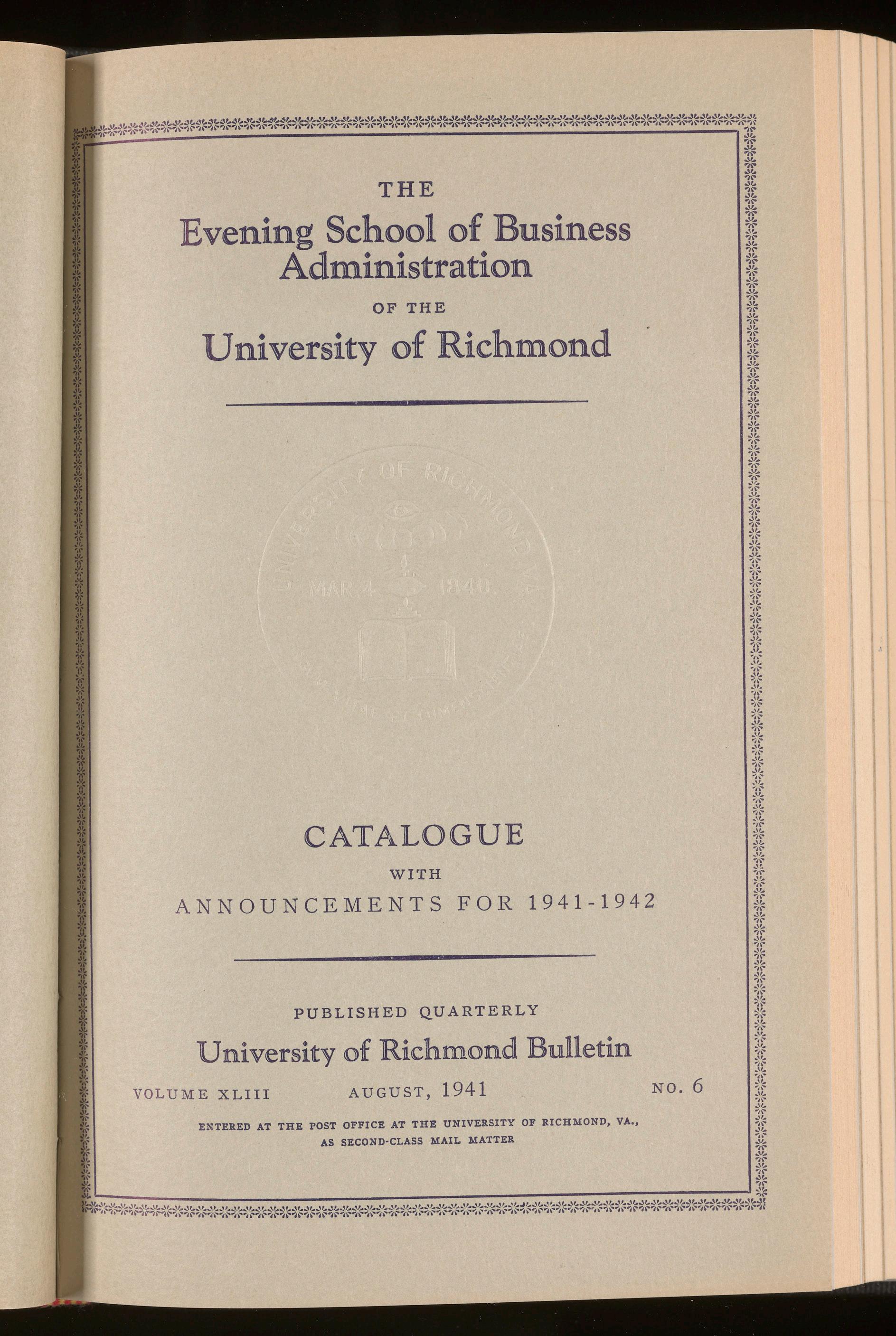


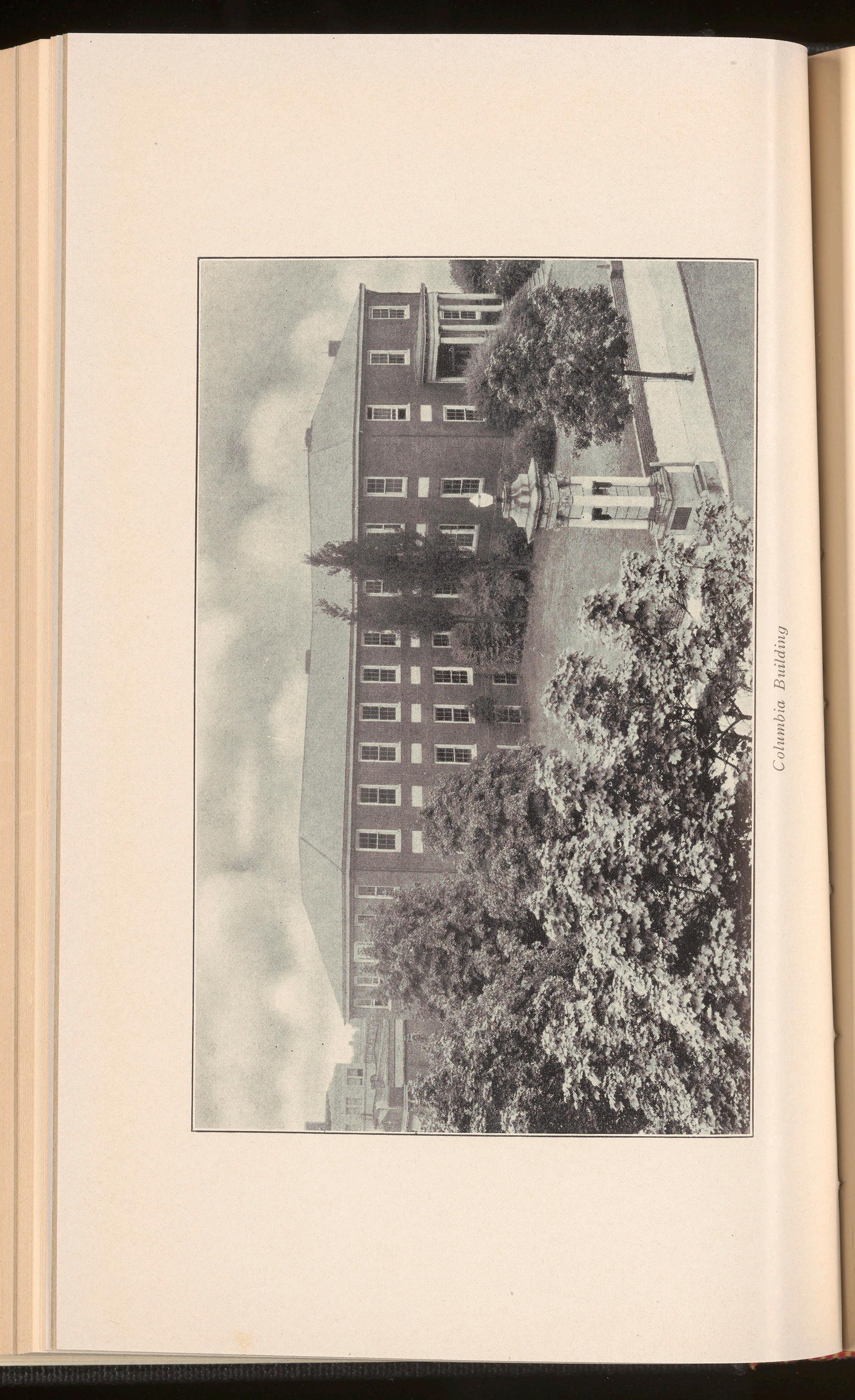





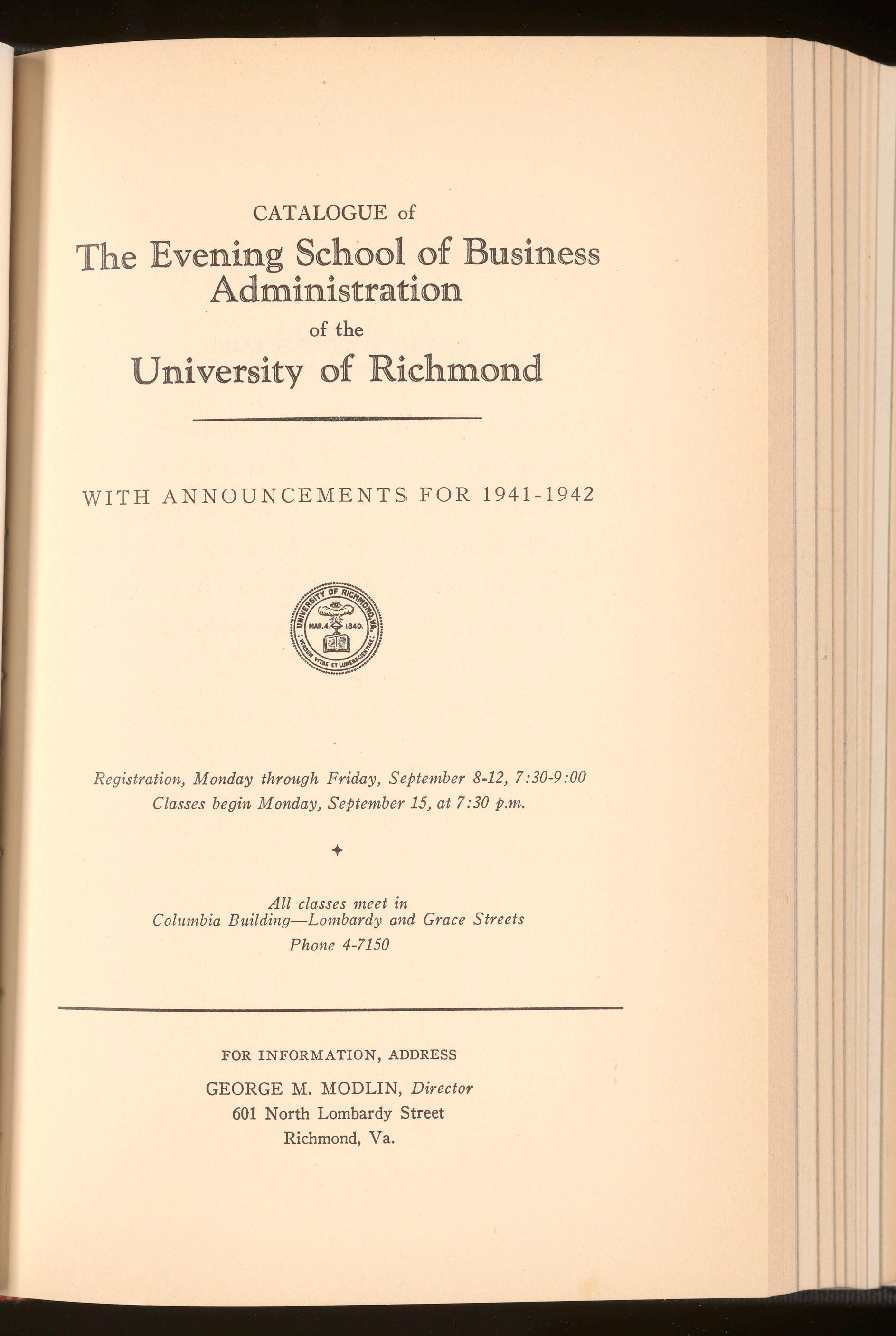
Regi s trat i on, Monday through Friday, September 8-12, 7:30-9:00 Classes begin Monday, September 15, at 7:30 p .m.
All classes meet in Columbia B11ildi11_q-Lo111bardyand Grace Streets Phone 4-7150
FOR INFORMATION, ADDRESS
GEORGE M. MODLIN, Director
601 North Lombardy Street Richmond, Va.
T. COLEMAN ANDREWS
NORMAN CALL
DOUGLAS S . FREEMAN
JACK G. HOLTZCLAW
J. AMBLER JOHNSTON
T. JUSTIN MOORE
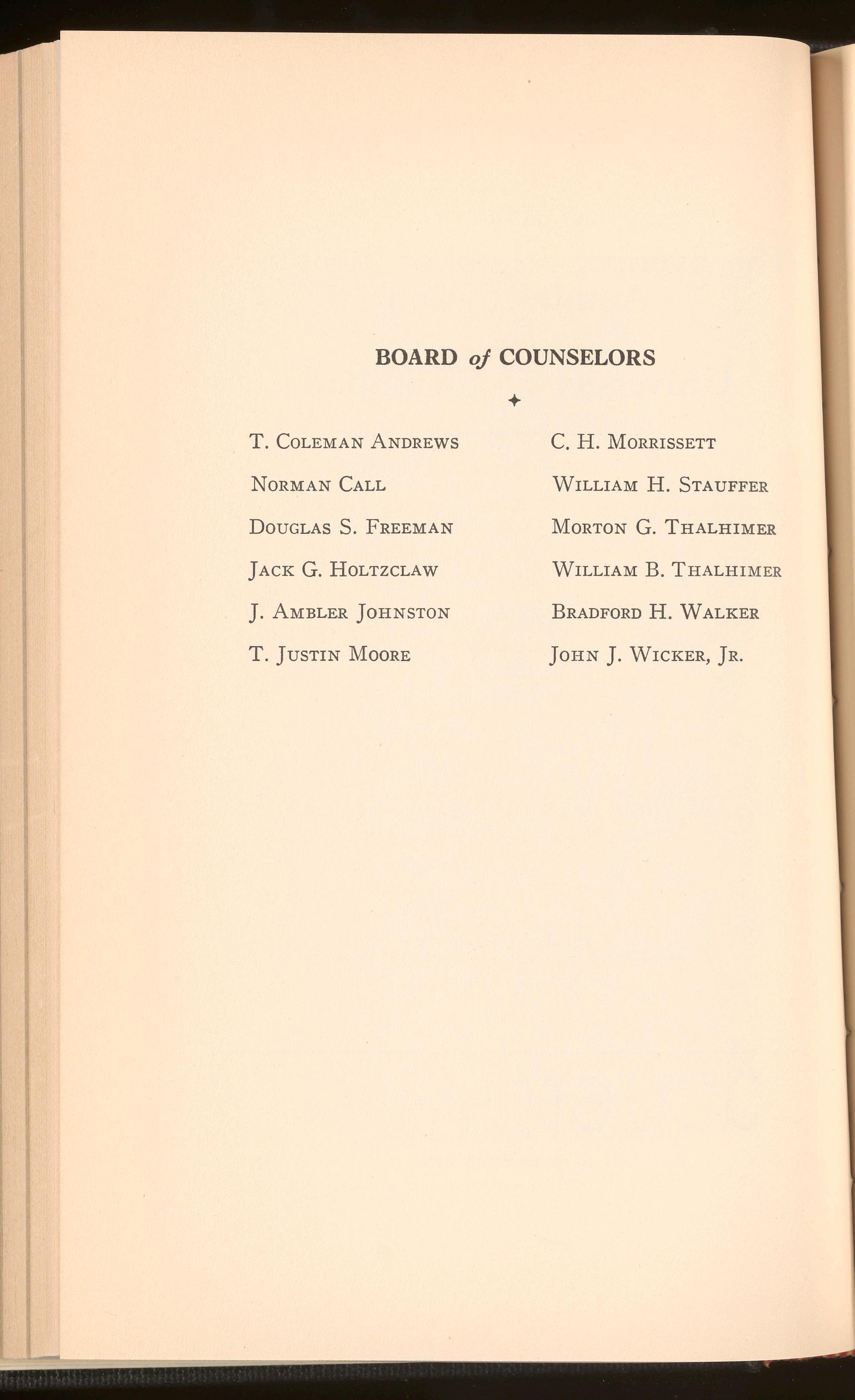
C. H. MORRISSETT
WILLIAM H. STAUFFER
MORTON G. THALHIMER
WILLIAM B. THALHIMER
BRADFORD H. WALKER
JOHN J. WICKER, JR.
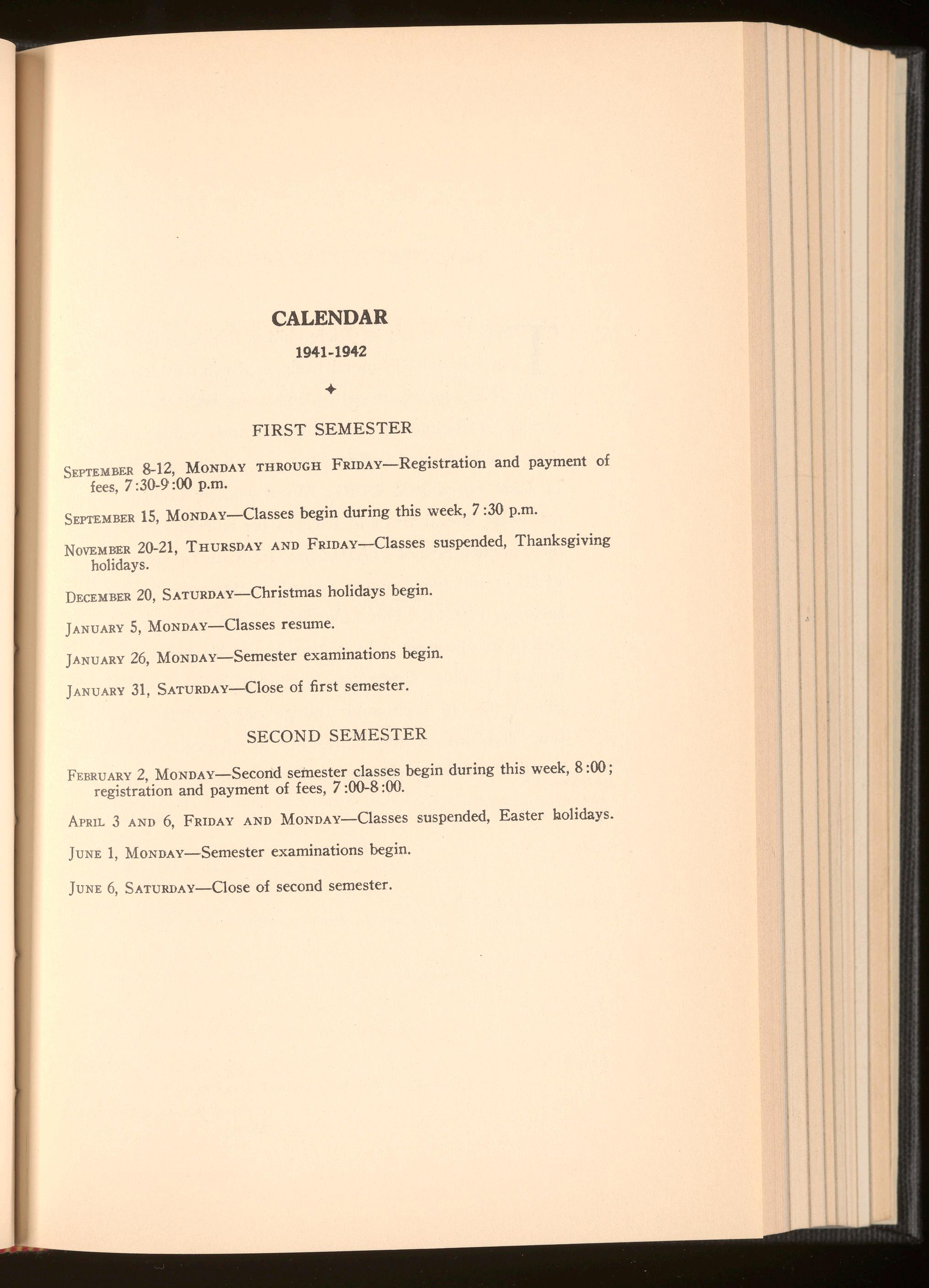
SEPTEMBER8-12, MONDAYTHROUGHFRIDAY-Registration and payment of fees, 7 :30-9 :00 p.m.
SEPTEMBE R 15, MONDAY-Classes begin during this week, 7 :30 p.m.
NoVEMBER20-21, THURSDAYAND FRIDAY-Classes suspended, Thanksgiving holidays.
DECEMBE R 20, SATURDAY-Christmas holidays begin.
JANUARY5, MoNDAY-Classes resume.
JANUARY26, MoNDAY-Sernester examinations begin.
JANUARY31, SATURDAY-Close of first semester
FEBRUARY 2, MONDAY-Second semester classes begin during this week, 8:00; regist r ation and payment of fees, 7 :00-8 :00.
APRIL3 AND6, FRIDAYAND MoNDAY-Classes suspended, Easter bolidays.
JuNE 1, MONDAY-Semester examinations begin.
JuNE 6, SATURDAY-Close of second semester.
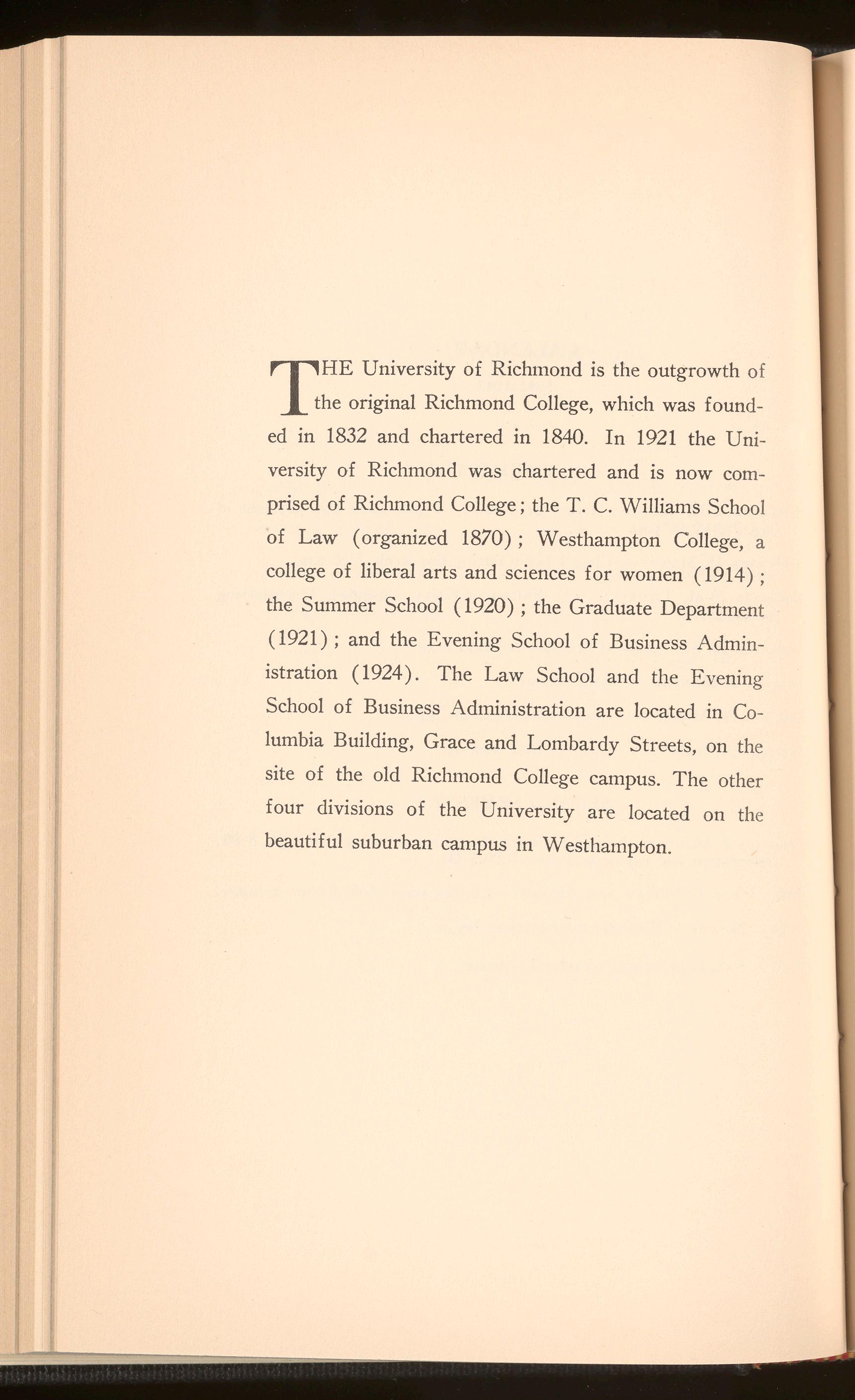
,.......,HE University of Richmond is the outgrowth of _J_the original Richmond College, which was founded in 1832 and chartered in 1840. In 1921 the University of Richmond was chartered and is now comprised of Richmond College; the T. C. Williams School of Law (organized 1870); Westhampton College, a college of liberal arts and sciences for women (1914); the Summer School ( 1920); the Graduate Department ( 1921) ; and the Evening School of Business Administration ( 1924). The Law School and the Evening School of Business Administration are located in Columbia Building, Grace and Lombardy Streets, on the site of the old Richmond College campus. The other four divisions of the University are located on the beautiful suburban campus in Westhampton.
FREDERICK WILLIAM BOATWRIGHT, M.A., LL D. PRESIDENT
tBENJAMIN WEST TABB, B.A. VICE-PRESIDENT AND TREASURER
GEORGE M. MODLIN, Pa.D. DIRECTOR
M. RUTH SMITH, B.A. SECRETARY
R. C. A STROP , M.A.
Pro fessor of Psychology, University of Richmond, Va.
J. HERMA N ATKINS, JR., C.P A
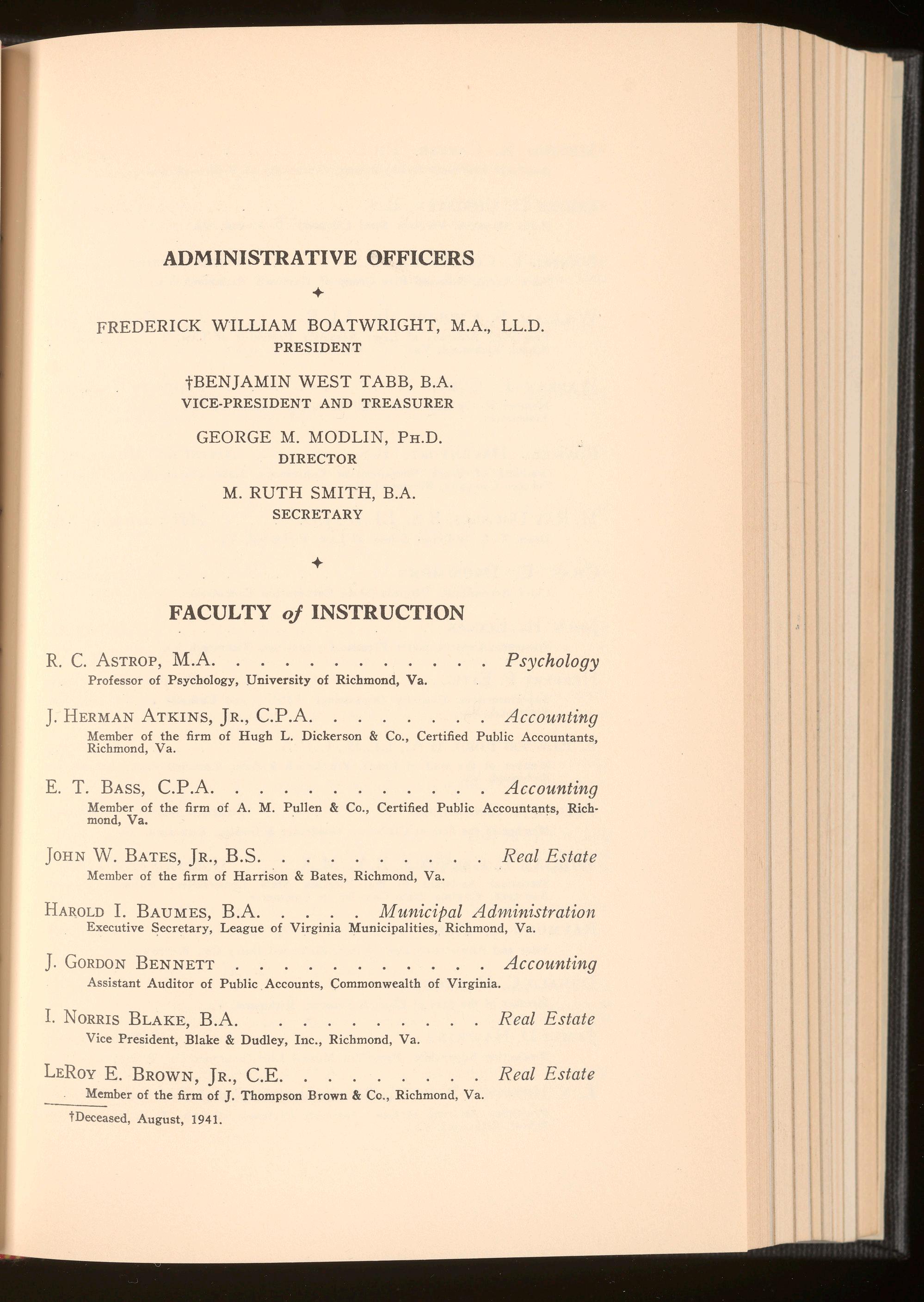
Psychology
Accounting
Member of the firm of Hugh L. Dickerson & Co., Certified Public Accountants, Richmond , Va
E. T. BASS, C.P.A.
Accounting
Member of the firm of A. M. Pullen & Co., Certified Public Accountants, Richmond , Va .
JOHN w . BAT E S, JR., B.S.
Member of the firm of Harrison & Bate s, Richmond, Va.
Real Estat e
HAROLD I. BAUMES, B.A. . Municipal Administration Execu tive Secretary, League of Virginia Municipalities, Richmond , Va.
] GORDO N BENNETT
Accounting Ass ist ant Auditor of Public Accounts, Commonwealth of Virginia.
I. NORR I S BLAKE , B.A. R eal Estate Vice Pre s ident, Blake & Dudley, Inc , Richmond , Va.
LEROY E . BROWN , JR., C.E. R eal E stat e ___ M_cmber of the firm of J Thompson Brown & Co., Richmond , Va tDecease d, Au gust, 1941.
MERTON E . CARVER, PH.D. Psyc hology Associate Professor of Psychology, University of Richmond, Va.
LESTER H. CHRISTEN, B.S. Salesmanship Sales Manager, Virginia Steel Company, Richmond, Va.
DANIEL L. CouLBOURN, B.S.
Inland Marine Ins urance State Agent, N ational Fire Group of Hartford, Richmond, Va.
WILLIAM S. CuDLIPP, JR., LL.B. Business Law Practicing Attorney at Law; Associate Professor of Law, T. C. WilliaDl5 Lai, School, Richmond, Va
w ARREN F. CURTIS

Property Ins urance
Member of the firm of Boswell & Curtis, Richmond, Va.; member of State Bar Association .
ROSWELL DAVENPORT, B.S. S cientifie Management Gradu ate of Work Simplification Conference, Lake Placid, N. Y.; A merican Tobacco Company, Richmond, Va.
M. RAY DOUBLES, B.S., LL.B., J.D. Administrative Lirw Dean, T. C Williams School of Law, Richmond, Va .
CHAS. C. DRUMMOND Acco unting Chief Accountant, Virginia State Corporation Commission
JOHN H. ECCLES Accounting Secretary, Central States Electric Corporation, Richmond, Va.
HERBERT P. EITEL
Property Insu rance Superintendent , Casualty Department, Fidelity and Casualty Co. of New York, Richmond, Va.
E. ELWOOD FoRD, B.A., LL.B., C.P.A. Accounting Member of the staff of Leach, Rindfleisch & Scott, Certified Public Accountants, Richmond, Va.
FERGUS A. GOODRIDGE
Inland M a.rineI nsurance Member of the firm of Claiborne, Goodridge & Goddin, Richmond, Va
WILLIAM L. GRENOBLE, B.A., M.A. Governmental Finance Statistical Assistant to the Virginia State Comptroller; formerly Research As sistant , Virginia State Chamber of Commerce.
RAYMOND C. HALL Advert ising Sale s a nd Advertising Department, Richmond Dairy Co., Richmond, Va .
DONALD C. HANCOCK R eal Estate Member of the firm of Elam & Funsten, Richmond, Va.
JAMES D. HAWKINS Life Ins urance Production Supervi sor , Provident Mutual Life In surance Co., Richmond , Va
L. S. HERRINK, B.A., LL.B
Law of Real ond Personal Property
Practicing Attorney at Law ; Associate Professor of Law, T C Williams La" School, Richmond, Va
H ERBERT R. HILL, C.L.U.

Insurance
District Manager, Life Insurance Company of Virginia, Richmond, Va.
R ALP H Vv. HowE
Property Insurance
V ice President, Davenport Insurance Company, Richmond, Va.
ARTH UR N. KEMP, C.P.A.
Accounting
Member of the staff of Elkins & Durham, Certified Public Accountants, Richmond, Va.
WILL I A M A. KNIGHT, B.S., M.B.A.
Life Insuranc e In t ernal Auditing Section, Life Insurance Company of Virginia; Fellow, L. 0. M .A
LAWRENC E C. LOVEJOY, B.S.
Pe r sonn el Director, Reynolds Metals Co , Richmond, Va
DONALD G. MACDONALD , B.S , M.E.
Office Manag ement
Personnel Relations
Sup er visor of Training, E. I. du Pont de Nemours & Co , Richmond , Va
RALPH C. McDANEL, PH D.
Pr ofessor of American History, University of Richmond , Va
JOHN G . MAY, JR., LL.B.
Gov ernnien t
Casualty Insuran ce Law
Member of the firm of May , Simpkins & Young , Richmond, V a
F BYER S MILLER, B.S , M.B.A
Corporation Fin ance
Assoc iat e Professor of Applied Economics , University of Richmond, V a. ; for• merly In structor in Busine ss Administration, Ohio State U niver s it y .
Economics
GEORGE M MODLIN, PH.D.
Forme rly Assistant Professor of Economics, Princeton University, and Lecturer in Fin ance, Rutgers University.
tW. F PAYNE, B.S., C.P.A.
Accounting
Member of the staff of T. Coleman Andrews & Co , Certified Public Accountants, Richmond , Va.
EDWA RD C. PEPLE, PH.D.
Business English
Ass ista nt Profe ss or of English, University of Richmond, Va. ; formerly Assistant in En gli sh, Harvard University, and Instructor in English, Wells College, N Y,
RAYM ON D B. PINCHBECK, PH.D.
Social Insura nce D ean, Richmond College, University of Richmond, Va,
LEWIS F. POWELL, JR., B.S., LL.B., LL.M.
Government and Business
Member of the firm of Hunton, Williams, Anderson, Gay & Moore , Attorneys at Law, Richmond , Va.; formerly Assistant in Business Law, Washington and Lee U niversity.
J AME S w. RAWLES, B.A. , M.B.A.
Life Insura n ce Fina nce
___ A_s_sistant Vice President, State-Planters Bank & Trust Co. , Richmond, Va tO n leave
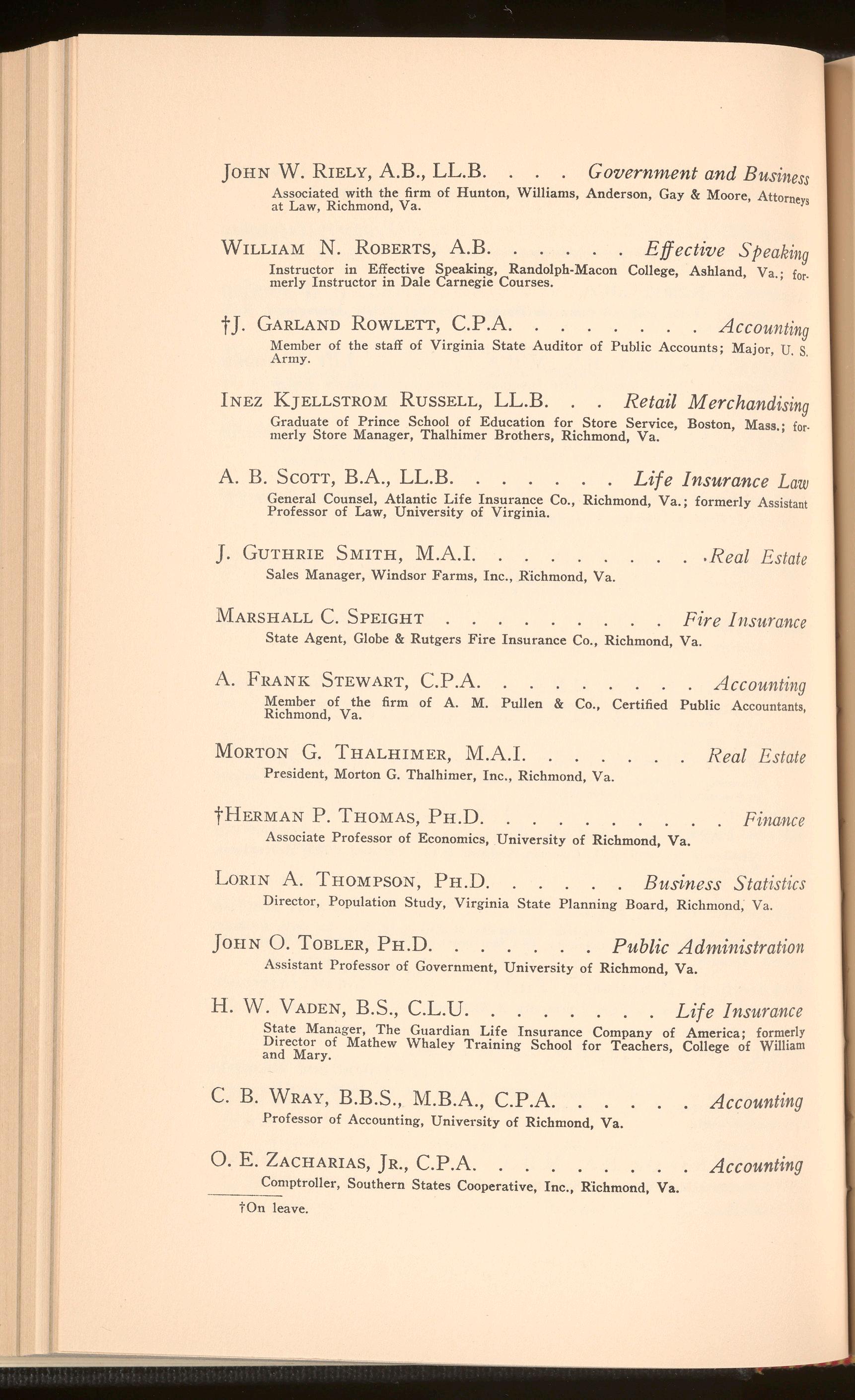
JOHN W. RIELY, A.B., LL.B.
Government and Business Associated with the firm of Hunton, Williams, Anderson, Gay & Moore, Attorneys at Law, Richmond, Va.
WILLIAM N. ROBERTS, A.B. Effective Speaking Instructor in Effective Speaking, Randolph-Macon College, Ashland, Va.; for- merly Instructor in Dale Carnegie Courses.
tJ. GARLAND RowLETT, C.P.A.
Accounting Member of the staff of Virginia State Auditor of Public Accounts; Major, U. S. Army.
INEZ KJELLSTROM RussELL, LL.B.
Retail Merchandising Graduate of Prince School of Education for Store Service, Boston, Mass.; for- merly Store Manager, Thalhimer Brothers, Richmond, Va.
A. B. ScoTT, B.A., LL.B.
Life Insurance Law General Counsel, Atlantic Life Insurance Co., Richmond, Va.; formerly Assistant Professor of Law, University of Virginia.
J. GUTHRIE SMITH, M.A.I. ,Real Estate Sales Manager, Windsor Farms, Inc., Richmond, Va.
MARSHALL C. SPEIGHT
Fire Insurance State Agent, Globe & Rutgers Fire Insurance Co., Richmond, Va.
A. FRANK STEWART, C.P.A.
Accounting Member of the firm of A. M. Pullen & Co., Certified Public Accountants, Richmond, Va.
MORTON G. THALHIMER, M.A.I.
Real Estate President, Morton G. Thalhimer, Inc., Richmond, Va.
tHERMAN P. THOMAS, PH.D.
Finance Associate Professor of Economics, University of Richmond. Va.
LORIN A. THOMPSON, PH.D.
Business Statistics Director, Population Study, Virginia State Planning Board, Richmond, Va.
JOHN 0. TOBLER, PH.D.
Public Administration Assistant Professor of Government, University of Richmond, Va.
H. W. VADEN, B.S., C.L.U. Life Insurance State Manager, The Guardian Life Insurance Company of America; formerly Director of Mathew \Vhaley Training School for Teachers, College of William and Mary.
C. B. WRAY, B.B.S., M.B.A., C.P.A.
Accounting Professor of Accounting, University of Richmond, Va.
0. E. ZACHARIAS, JR., C.P.A. Accounting Comptroller, Southern States Cooperative, Inc., Richmond, Va .ton leave.
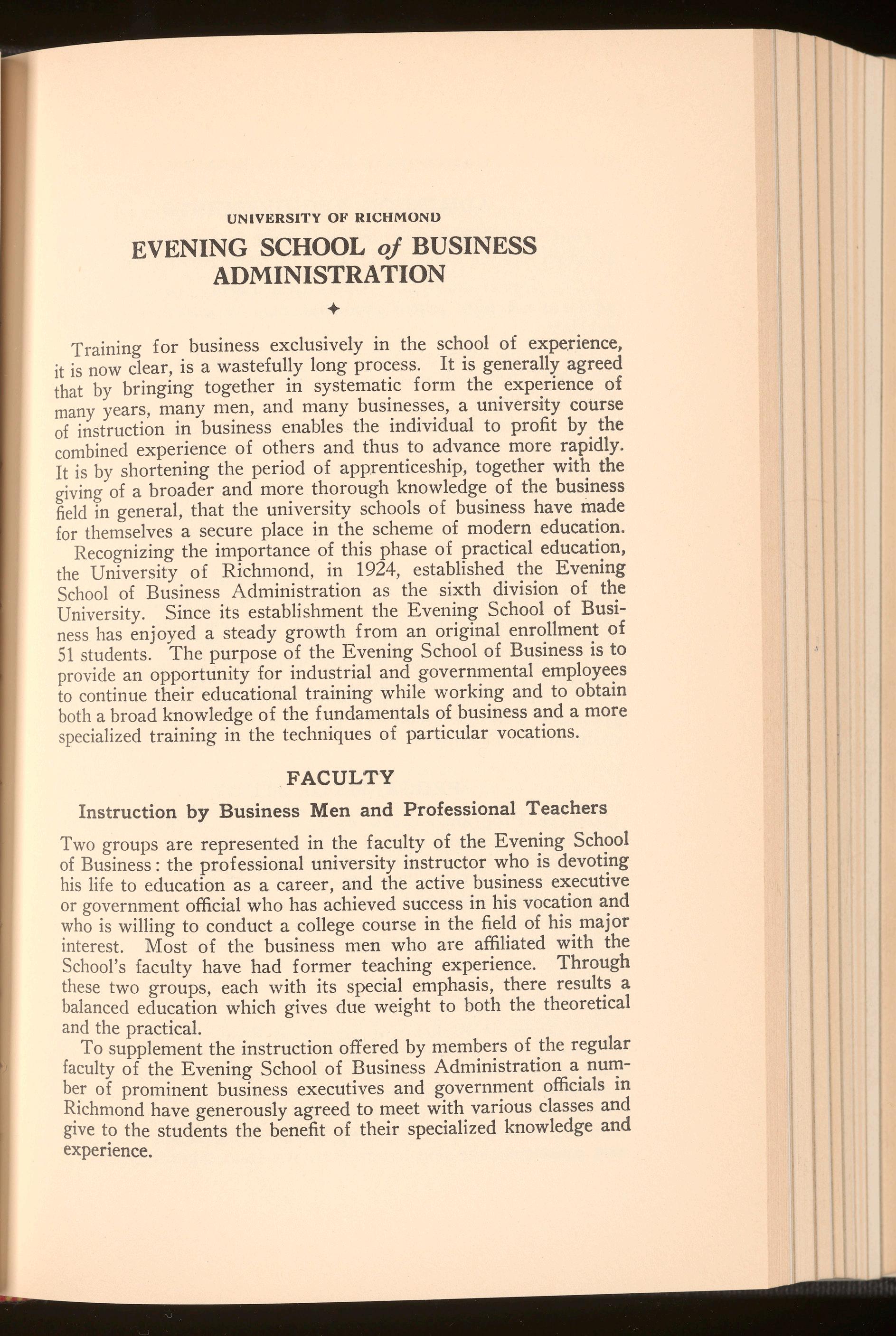
Training for business exclusively in the school of expe.rience, it is now clear, is a wastefully long process. It is generally agreed that by bringing together in systematic form the experience of many years, many men, and many businesses, a university course of instruction in business enables the individual to profit by the combined experience of others and thus to advance more rapidly. It is by shortening the period of apprenticeship, together with the giving of a broader and more thorough knowledge of the business field in general, that the university schools of business have made for themselves a secure place in the scheme of modern education. Recognizing the importance of this phase of practical education, the University of Richmond, in 1924, established the Evening School of Business Administration as the sixth division of the University. Since its establishment the Evening School of Business has enjoyed a steady growth from an original enrollment of 51 students. The purpose of the Evening School of Business is to provide an opportunity for industrial and governmental employees to continue their educational training while working and to obtain both a broad knowledge of the fundamentals of business and a more specialized training in the techniques of particular vocations.
Instruction by Business Men and Professional Teachers
Two groups are represented in the faculty of the Evening School of Business : the professional university instructor who is devoting his life to education as a career, and the active business executive or government official who has achieved success in his vocation and who is willing to conduct a college course in the field of his major interest. Most of the business men who are affiliated with the School's faculty have had former teaching experience. Through these two groups, each with its special emphasis, there results a balanced education which gives clue weight to both the theoretical and the practical.
To supplement the instruction offered by members of the regular faculty of the Evening School of Business Administration a numb~r of prominent business executives and government officials in ~1chmond have generously agreed to meet with various classes and give to the students the benefit of their specialized knowledge and experience.

Four classifications of students, both men and women, are admitted into the Evening School of Business Administration:
( 1) Special students. Adults over twenty-one years of age who are not high school graduates may be admitted as special students.
(2) High school graduates. Young men and women who have graduated from high school with at least fifteen approved units are eligible to enter.
( 3) Present or former college students. To those young people who have attended college a year or more without graduating, the Evening School of Business offers an opportunity to continue their university training while being employed. Courses are also elected for credit by undergraduates now attending other divisions of the University, especially in Richmond College and the T. C. Williams School of Law.
( 4) College graduates. Many students enrolled in the Evening School of Business are college and university graduates. Graduates of literary colleges who wish to extend their general education, graduates of engineering colleges who wish to supplement their technical knowledge, and graduates of university schools of commerce who wish to specialize further in particular fields of activity, have found benefit in the training provided. College graduates who are seeking a graduate degree can also obtain credits in the Evening School.
Degree Program-Work done in the Evening School of Business Administration is of full college grade and is accepted toward a degree in the University of Richmond or other colleges and universities. To receive college credit a student must meet the college requirements for entrance, must attend classes regularly, and must pass the examinations at the end of the semester. For e-yery course passed each semester, two semester-hours credit is given.
The degree of Bachelor of Science in Business Administration is awarded to either men or women by the University of Richmond for a course of study completed in the Evening School' of Business Administration according to the following requirements: A candidate for the degree of Bachelor of Science in Business Administration from the Evening School of Business Administration must complete one hundred twenty-four semester hours, at
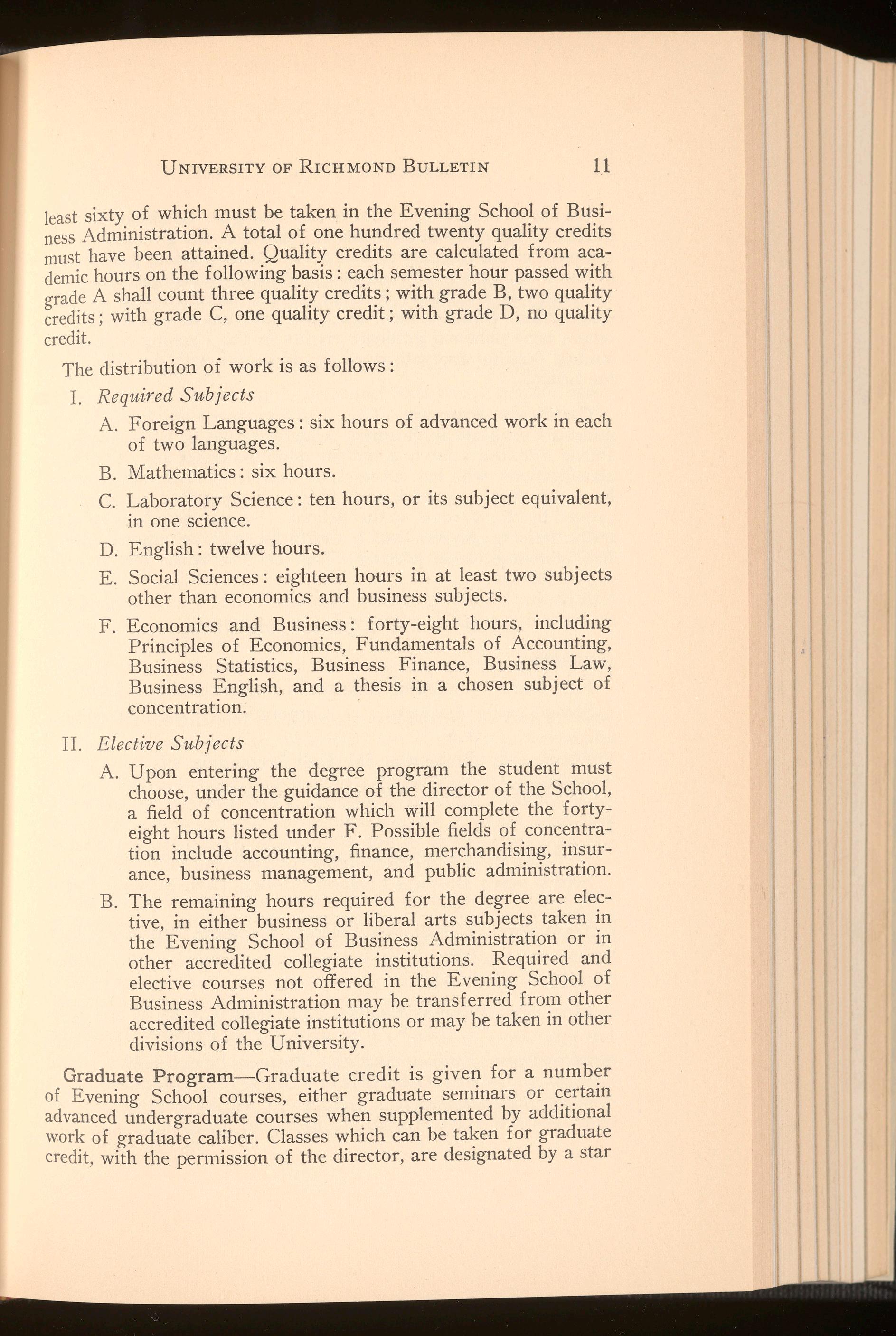
least sixty of which must be taken in the Evening School of Business Administration. A total of one hundred twenty quality credits must have been attained. Quality credits are calculated from academic hours on the following basis: each semester hour passed with grade A shall count three quality credits; with grade B, two quality credits; with grade C, one quality credit; with grade D, no quality credit.
The distribution of work is as follows :
A. Foreign Languages: six hours of advanced work in each of two languages.
B. Mathematics : six hours.
C. Laboratory Science: ten hours, or its subject equivalent, in one science.
D. English: twelve hours.
E. Social Sciences: eighteen hours in at least two subjects other than economics and business subjects.
F. Economics and Business: forty-eight hours, including Principles of Economics, Fundamentals of Accounting, Business Statistics, Business Finance, Business Law, Business English, and a thesis in a chosen subject of concentration.
A. Upon entering the degree program the student must choose, under the guidance of the director of the School, a field of concentration which will complete the fortyeight hours listed under F. Possible fields of concentration include accounting, finance, merchandising, insurance, business management, and public administration.
B. The remaining hours required for the degree are elective, in either business or liberal arts subjects taken in the Evening School of Business Administration or in other accredited collegiate institutions. Required and elective courses not offered in the Evening School of Business Administration may be transferred from other accredited collegiate institutions or may be taken in other divisions of the University.
Graduate Program-Graduate credit is given for a number of Evening School courses, either graduate seminars or certain advanced undergraduate courses when supplemented by additional work of graduate caliber. Classes which can be taken for graduate credit, with the permission of the director, are designated by a star
in the list of courses described in the catalogue. Graduate students interested especially in the fields of economics and government can complete in the Evening School a substantial portion, possibly all, of the work necessary to obtain a Master of Arts degree from the University of Richmond. Credits can also be transferred to other universities. Business men, teachers, government employees, and others have obtained graduate credits in the Evening School. A student desiring graduate work should confer with the director of the School.
University of Richmond will grant a Certificate in Business Administration or a Certificate in Public Administration to a student, admitted under any of the four classifications, who has successfully completed thirty-six semester hours of classroom work according to a prescribed program approved by the director of the School. Several programs of concentration are offered, and a Certificate will be granted in the field of concentration selected. The curricula in the several fields are as follows :
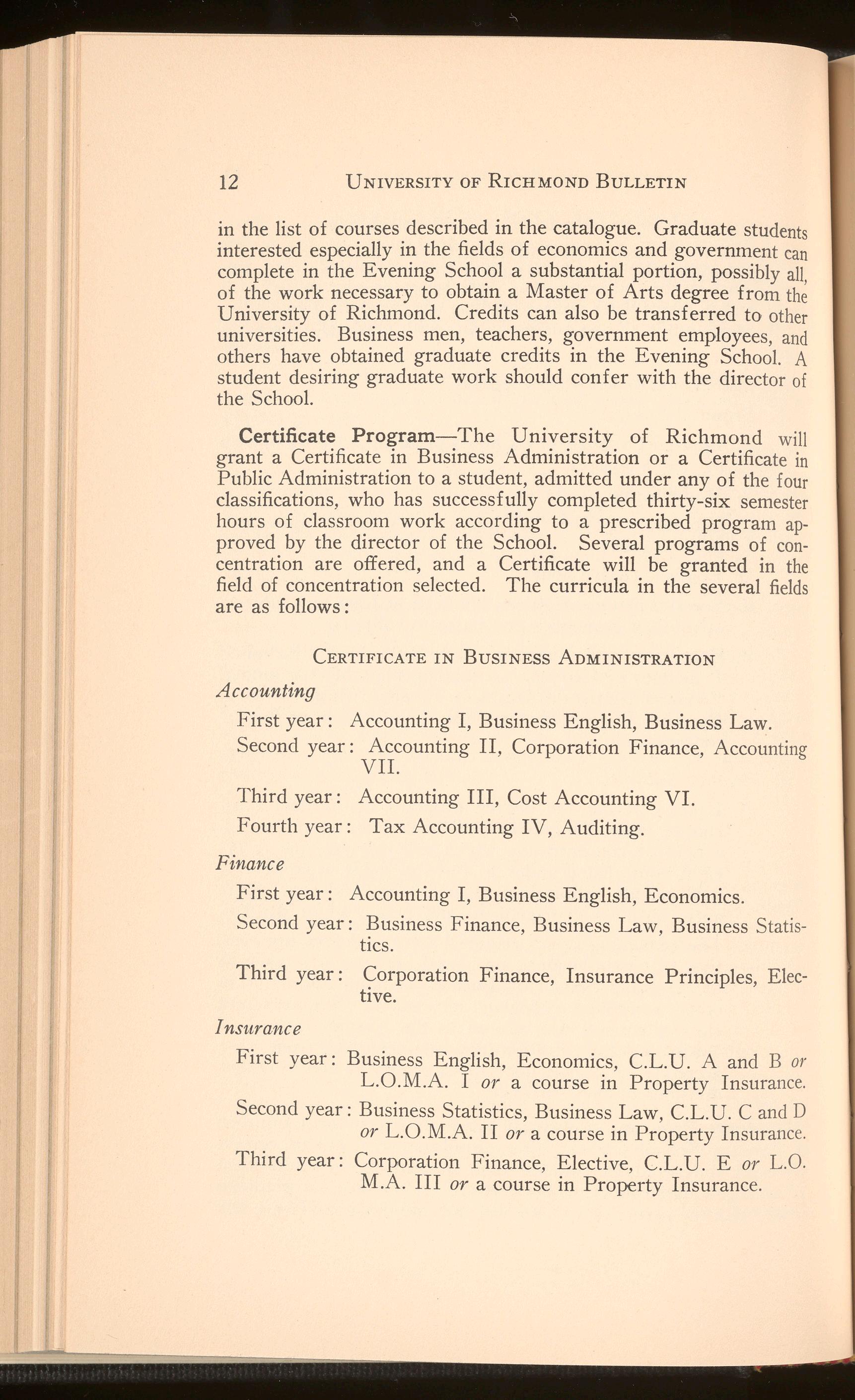
Accounting
First year : Accounting I, Business English, Business Law .
Second year: Accounting II, Corporation Finance, Accounting VII.
Third year: Accounting III, Cost Accounting VI.
Fourth year: Tax Accounting IV, Auditing.
Finance
First year: Accounting I, Business English , Economics.
Second year: Business Finance, Business Law, Business Statistics.
Third year: Corporation Finance, Insurance Principles, Elective.
Insurance
First year: Business English, Economics, C.L.U. A and B or L.O.M.A. I or a course in Property Insuran ce.
Second year: Business Statistics, Business Law, C.L.U . C and D or L.O.M.A. II or a course in Property Insuran ce.
Third year: Corporation Finance, Elective, C.L.U. E or L.0. M.A. III or a course in Property Insurance .

Merchandising
First year: Business English, Business Psychology, Store Management.
Second year : Accounting I, Economics, Salesmanship.
Third year: Advertising, Business Law, Personnel Relations.
Business M a:nagenient
F ir st year: Economics , Business Law, Business Psychology.
Second year: Accounting I, Personnel Relations, Scientific Management.
T hird year : Business Finance, Office Management, Business Statistics.
Fi r st year: Principles of Public Administration, Virginia Government and National Government, Business English .
Second year : Public Financial Administration, Governmental Accounting VII, Economics, Electives to complete 12 semester hours.
T hird year: Public Reporting, Administrative Law, Electives to complete 12 semester hours.
A gene ral curriculum in Business Administration may be composed of Business English, Business Law, Economics, Accounting I, and Electives to complete thirty-six semester hours. Electives in any program may be chosen from other courses in the catalogue, subj ect to the approval of the director. Although a specific number of years is designated for a Certificate, the required work may be completed in a different sequence and in more or less time, depending upon the abilities and circumstances of the student .
Individual-Course Program-Many persons desire to enroll in individual courses for vocational or cultural value without regard to college credits or a certificate curriculum . Unless special tra ining or prerequisite courses are necessary, all courses announced in this catalogue may be elected on an individual basis by students admitt ed und er any of the four classifications.
Any stud ent following either of the four programs of study may elect on e or more classes , according to his or her wishes and ability. A lthough it is possibl e to carry as many as five classes each semester , such a schedule would load a student to capacity and is r ecommended only to the most earnest and capable students. By doing so , however, a student can obtain twenty semester-hours credit each session.
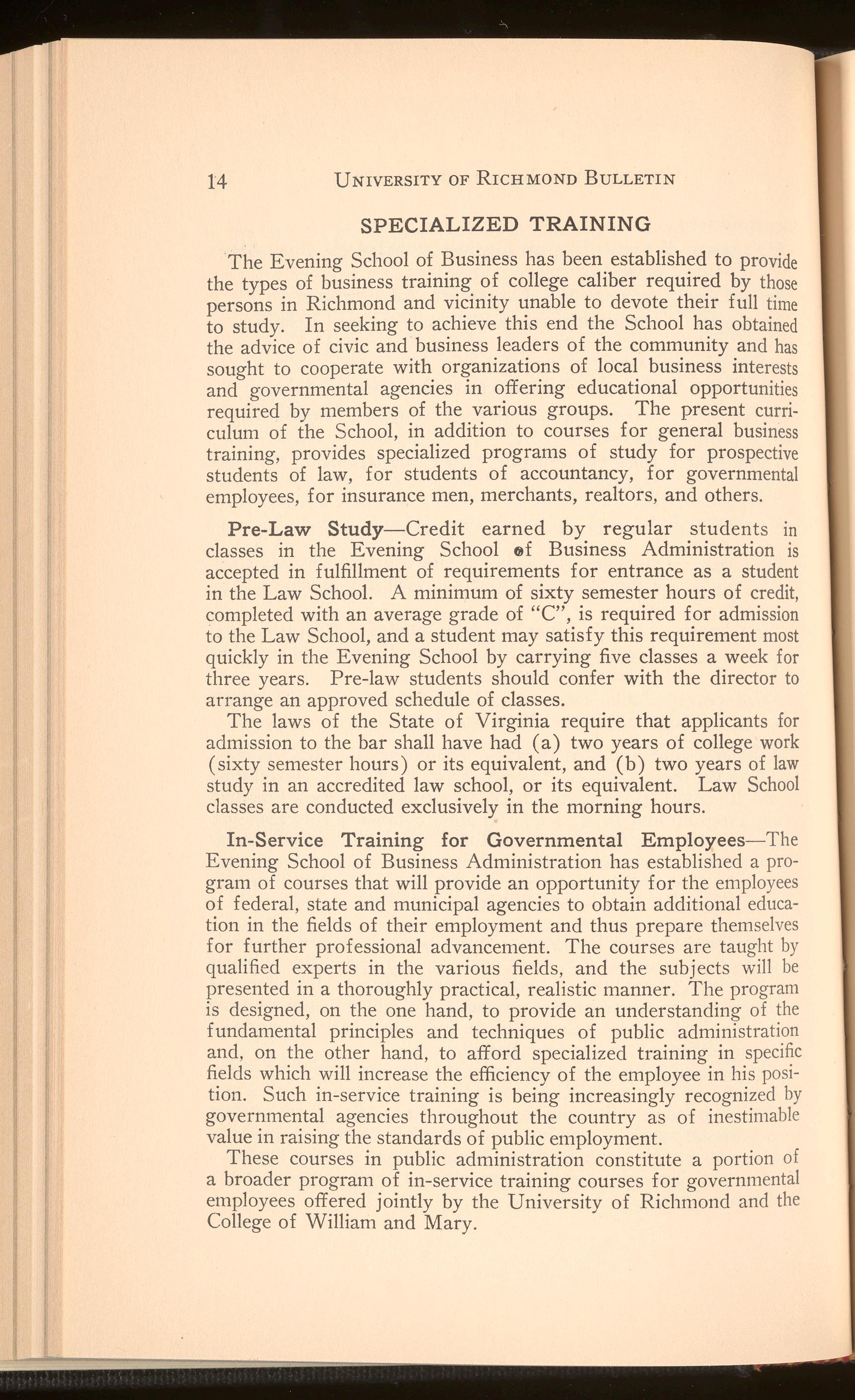
The Evening School of Business has been established to provide the types of business training of college caliber required by those persons in Richmond and vicinity unable to devote their full time to study. In seeking to achieve this end the School has obtained the advice of civic and business leaders of the community and has sought to cooperate with organizations of local business interests and governmental agencies in offering educational opportunities required by members of the various groups. The present curriculum of the School, in addition to courses for general business training, provides specialized programs of study for prospective students of law, for students of accountancy, for governmental employees, for insurance men, merchants, realtors, and others.
earned by regular students in classes in the Evening School @f Business Administration is accepted in fulfillment of requirements for entrance as a student in the Law School. A minimum of sixty semester hours of credit, completed with an average grade of "C", is required for admission to the Law School, and a student may satisfy this requirement most quickly in the Evening School by carrying five classes a week for three years. Pre-law students should confer with the director to arrange an approved schedule of classes.
The laws of the State of Virginia require that applicants for admission to the bar shall have had (a) two years of college work ( sixty semester hours) or its equivalent, and (b) two years of law study in an accredited law school, or its equivalent. Law School classes are conducted exclusively in the morning hours.
Evening School of Business Administration has established a program of courses that will provide an opportunity for the employees of federal, state and municipal agencies to obtain additional education in the fields of their employment and thus prepare thems elves for further professional advancement. The courses are taught by qualified experts in the various fields, and the subjects will be presented in a thoroughly practical, realistic manner. The program is designed, on the one hand, to provide an understanding of the fundamental principles and techniques of public administrati on and, on the other hand, to afford specialized training in specific fields which will increase the efficiency of the employee in his position. Such in-service training is being increasingly recognized by governmental agencies throughout the country as of inestimable value in raising the standards of public employment.
These courses in public administration constitute a portion of a broader program of in-service training courses for governm ental employees offered jointly by the University of Richmond and the College of William and Mary.
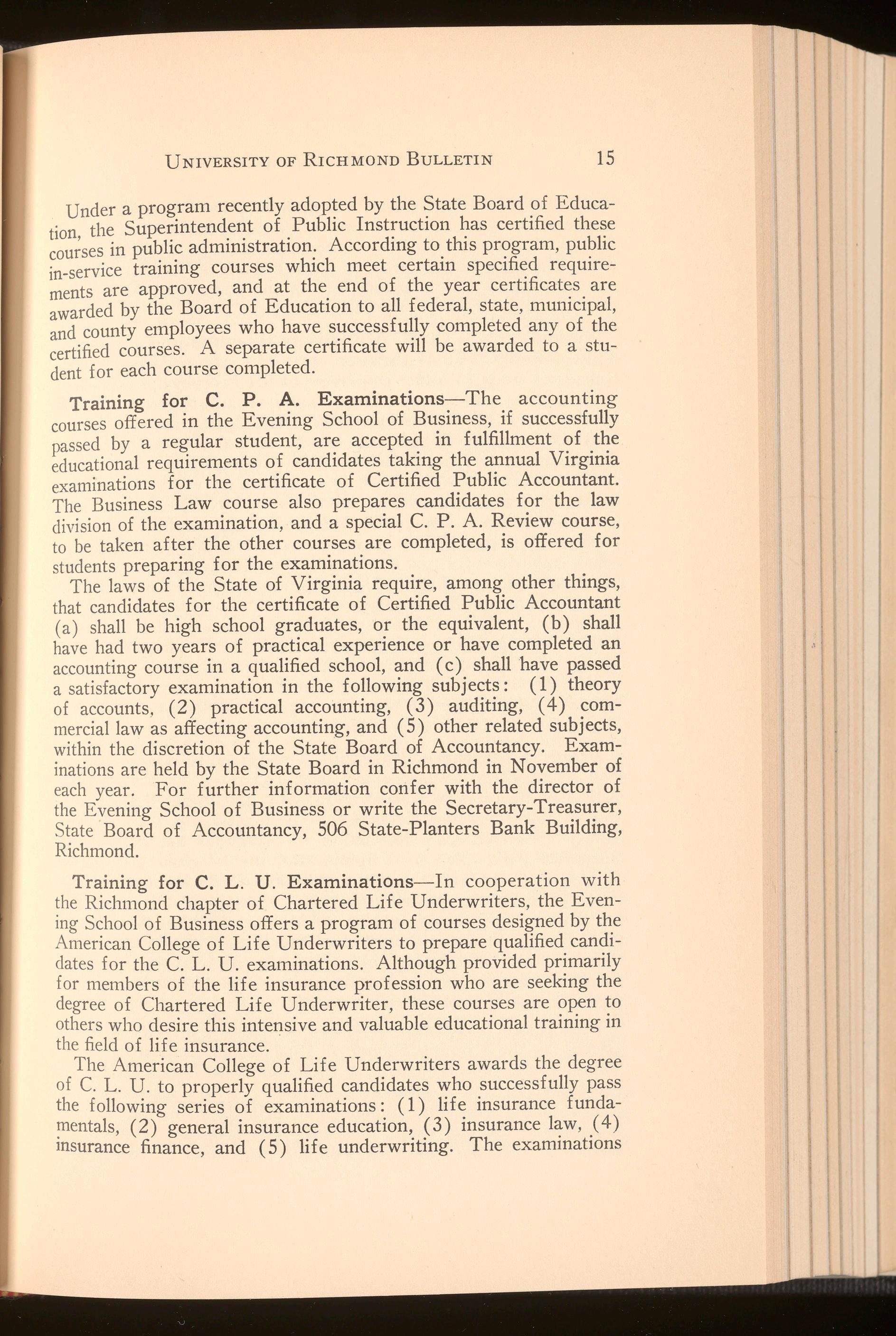
Under a program recently adopted by the State Board of Education the Superintendent of Public Instruction has certified these cou;ses in public administration. According to this program, public in-service training courses which meet certain specified requirements are approved, and at the end of the year certificates are awarded by the Board of Education to all federal, state, municipal, and county employees who have successfully completed any of the certified courses. A separate certificate will be awarded to a student for each course completed .
Training for C. P. A. Examinations-The accounting courses offered in the Evening School of Business, if successfully passed by a regular student, are accepted in fulfillment of the educational r equirements of candidates taking the annual Virginia examinati ons for the certificate of Certified Public Accountant. The Business Law course also prepares candidates for the law division of the examination, and a special C. P. A. Review course, to be ta ken after the other courses are completed, is offered for students preparing for the examinations
The law s of the State of Virginia require, among other things, that candidates for the certificate of Certified Public Accountant (a) shall be high school graduates, or the equivalent, (b) shall have ha d two years of practical experience or have completed an accounting course in a qualified school, and ( c) shall have passed a satisfactor y examination in the following subjects: ( 1) theory of accounts , (2) practical accounting, (3) auditing, ( 4) commercial law as affecting accounting, and (5) other related subjects, within th e discretion of the State Board of Accountancy Examination s ar e held by the State Board in Richmond in November of each year. For further information confer with the director of the Evenin g School of Business or write the Secretary-Treasurer, State Boa rd of Accountancy, 506 State-Planters Bank Building, Richmond.
Tr a ining for C. L. U. Examinations-In cooperation with the Richmond chapter of Chartered Life Underwriters , the Evening School o f Business offers a program of courses designed by the American College of Life Underwriters to prepare qualified candidates for th e C. L. U. examinations. Although provided primarily for members of the life insurance profession who are seeking the degree of Chartered Life Underwriter, these courses are open to others who desire this intensive and valuable educational training in the field of life insurance. ·
The American College of Life Underwriters award s the degree of C. L. U to properly qualified candidates who successfully pass the following series of examinations: ( 1) life insurance funda~enta ls, (2) general insurance education, (3) insurance law, (4) msur ance finance, and ( 5) life underwriting. The examination s

in these subjects are prepared and graded by the Examining Board of the American College of Life Underwriters, and the Ev ening School of Business supervises the examinations in June of each year. The examinations may be taken in installments at the option of the candidate For further information consult the descri ption of the courses and confer with the director.
e Life Office Management Association Institute has prepared several courses of study for office employees of life insurance home offices , branch offices, and agency offices. Examinations are given each year by the L. 0. M . A. Institute, and awards are granted up on the satisfactory completion of each of the several courses. Cour se I, which covers the basic principles of life insurance, is compo sed of four examinations which must be completed by employees o f both home offices and agency offices who seek the L. 0. M ' . A. certifi cate. Course II prepares home office employees for six additional examinations in advanced life insurance. Coure IIA prepares agency office employees for six alternative examinations in field agency office management. Course III is a graduate course for both home office and agency office employees.
The Life Agency Managers , Inc. , and various life insur ance home offi.ces in Richmond cooperate with the Evening School of Business in offering preparation specifically for persons wh o wish to take the L. 0. M A. Institute examinations. More compl et e information is contained in the description of the courses and can be obtained from the director of the Evening School.
Property Insurance Program - A program of courses in t he field of property insurance has been organized by the Ev ening School of Business in collaboration with, and under the sp onsorship of, the Insurance Exchange of Richmond, the Casualty and Surety Underwriters' Association of Virginia, the Stock Fire Insuranc e Yield Club of Virginia, and the Virginia Assoc iation of Insurance Agents. Courses are offered in the various lines of property insurance, including casualty, surety and fidelity bonds, fire , marine and inland marine, and others. Although designed primarily for insurance agents, solicitors, and office staffs, these courses prove valuable to undergraduates and others who contemplate entering this profession and also to business men who purchase the different types of insurance.
Real Estate Program-A series of courses in real est ate is offered by the Evening School of Business in cooperation with, and under the supervision of , the Richmond Real Estate Exch ange. Conducted by the Education Committee of the Exchange , the courses deal with the fundamental principles in the various branches of the real estate business . The program is org an ized mainly for persons connected with the profession of real estate,

but the classes will be open to all who wish to take advantage of the training provided.
Office Management-The Richmond Chapter of the National Office Management Association sponsors a course of training for office employees and persons who will seek office employment. One of the functions of the National Association is to cooperate with business _educational institutions in improving instru~tion in office occupations and procedures, and the School of Business Ad ministration is glad to assist in this objective.
Class Hours-Classes meet once each week, beginning at 7 :30 P. M. and continuing for 100 minutes, unless stipulated otherwise in th e description of particular courses.
Fees-Tuition fees are payable each semester in advance . Student s are expected to pay all fees at the time of registration or before att ending the first meeting of the classes for which they have enrolled. The fee for each course taken is $12 50 per semester, or $25 .00 for a full-year course.
Grading-The standing of students is indicated as follows: A (95-100%) excellent work; B (88-94%) very good work ; C (80-87% ) fair or average work; D (75-79%) just passing; E (65-74%) unsatisfactory work, incurring a condition which may be r emoved through a re-examination; F (below 65%) a failure, without the right to a re-examination ; I, incomplete because of excused absence from final examination or because of failure to submit re quired work during the semester; N, no credit because of excessive or unexcused absences.
Removal of Conditions-A student who receives a grade of E, th ereby incurring a condition in a semester's work, may remove the condition and obtain credit for the course ( 1) by repeating the course successfully the following year, (2) by taking the r egula r examination in the course the following year and making a sufficiently high mark to raise the original term grade to J:?,or ( 3) by taking a special re-examination and making a suffic1~ntly high mark to raise his grade to D Special re-examinations will be given on specified dates in March and September, upon authori zat ion of the director and upon the payment of a fee of one dollar. A student is permitted only one re-examination on any condition, and if he is unsuccessful the condition is converted into a failur e .
A stud ent who receives a grade of I may obtain credit for the course ( 1) by taking the regular examination in the course the following year (2) by taking a special re-examination to be given

on specified dates in March and September, upon authorization of the director and without the payment of a fee, or ( 3) in the instance of incompleted class work, by submitting the required work immediately after the close of the semester.
A student who receives a grade of F or N must repeat the course successfully to obtain credit.
Absences-No credit can be given for a course if, during a semester, the student has more than four absences, whether excused or unexcused and including those caused by entering the course late, unless the instructor indicates in writing to the director that he believes the student is sufficiently qualified to be allowed credit for the course. Unexcused absences should result in an appropriate lowering of the student's grade, to be determined by the instructor. The grounds for excusing absences are ( l) illness, (2) a personal obligation recognized as valid by the instructor, and ( 3) religious holidays.
Honors and Scholarships-Five scholarships will be awarded in June, 1942, by the Board of Trustees of the University of Richmond to those students with the best scholastic record in the following five classes: Accounting I, Business English, Business Law, Economics, and Public Speaking. These scholarships will be awarded on the basis of academic records, determined by the director with the advice of the faculty. Each scholarship will entitle the recipient to free tuition in any one course taken in the Evening School of Business during the session of 1942-43.
The T. Coleman Andrews & Company prize of twenty-five dollars, established by the company whose name it bears, will be awarded to the student in any of the advanced classes in account· ing who is deemed by the director and the faculty to be best equipped by character, personality, intellectual capacity, and broad educational training to succeed in the profession of accountancy.
Library-Students in the Evening School of Business Administration are given access to the library of this division of the University of Richmond and to the library facilities of other divisions of the University. A large reading room and a specialized library dealing with economic subjects and current business affairs are maintained especially for the use of students of the Evening School of Business. Students are encouraged to broaden the scope of th~ir training by the use qf current periodical and pamphlet matenal made available in the School library.
A special collection of books in accounting and finance, known as !he Accountants' Library of Richmond, is maintained in the Evenmg School by the Richmond Society of Public Accountants. The books in the collection are available to all accountants and students of accounting in the city.
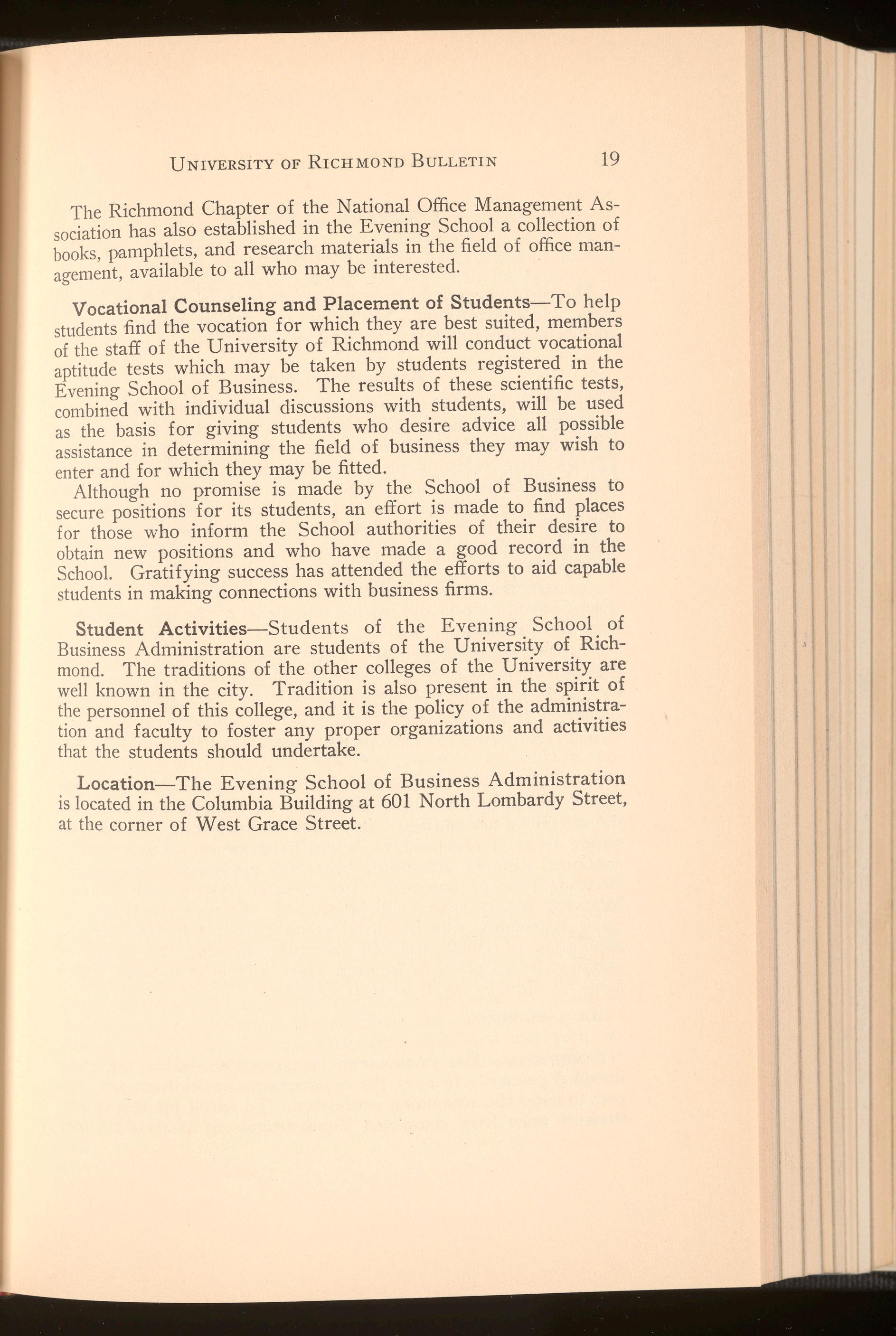
T he Richmond Chapter of the National Office Management Associati on has also established in the Evening School a collection of books, pamphlets, and research materials in the field of office management, available to all who may be interested.
Vocational Counseling and Placement of Students-To help student s find the vocation for which they are best suited, members of the staff of the University of Richmond will conduct vocational aptitude t ests which may be taken by students registered in the Evening School of Business. The results of these scientific tests, combined with individual discussions with students, will be used as the basis for giving students who desire advice all possible assistance in determining the field of business they may wish to enter and for which they may be fitted.
Although no promise is made by the School of Business to secur e positions for its students , an effort is made to find places for those who inform the School authorities of their desire to obtain new positions and who have made a good record in the School. Gratifying success has attended the efforts to aid capable students in making connections with business firms.
Student Activities-Students of the Evening School of Business Administration are students of the University of Richmond. The traditions of the other colleges of the University are well kn own in the city. Tradition is also present in the spirit of the pers onnel of this college, and it is the policy of the administration and faculty to foster any proper organizations and activities that th e students should undertake.
. Location-The Evening School of Business Administration 1s located in the Columbia Building at 601 North Lombardy Street, at the corner of West Grace Street.

For 1941-1942
The right is reserved to withdraw courses in which the enrollment is less than fifteen. Starred courses may be taken for graduate credit upon fulfilling additional requirements.
AccouNTING I. FUNDAMENTALSOF AccouNTING.-This course provides an introduction to the science of accounting ( 1) for those who intend to prepare themselves for accountancy as a profession, (2) for those seeking a general foundation in the various fields of business administration, ( 3) for those desiring the elements of accounting applicable in the practice of law, and ( 4) for those employed in the financial departments of governmental agencies. The study, though suited to the needs of beginners, advances rapidly through the principles of double entry bookkeeping to the construction of financial and operating statements. Interpretation of balance sheets and income statements of the sole proprietorship, the partnership, and the corporation will receive attention. Two hours per week throughout the year on Tuesday or Frid ay nights. ( Sections A and B begin in the first semester, while Section C, which begins in the second semester of each preceding year, concludes in the first semester.)
MR. KEMP , MR. ATKINS,ANDMR. ECCLES.
AccouNTING II. INTERMEDIATEAccouNTING.-To enter this course a student must have completed an introductory course in the science of accounting. The study of accounting for the corporate form of organization, begun in elementary accounting, is continued with the accounting procedure applicable to the manufacturing type of business. The voucher system and the selfbalancing factory ledger will be studied . Balance sheets and income statements will be made comparative; the statement of application of funds and the statement showing the causes of variation in net profit as between years will be introduced. Two hours on Monday nights of both semesters.
MR. ZACHARIAS.
AccouNTING III . ADVANCEDAccouNTING.-This course is intended primarily to meet the requirements of students who expect to enter the accounting profession. To enroll for this course students must have completed Fundamentals of Accounting and
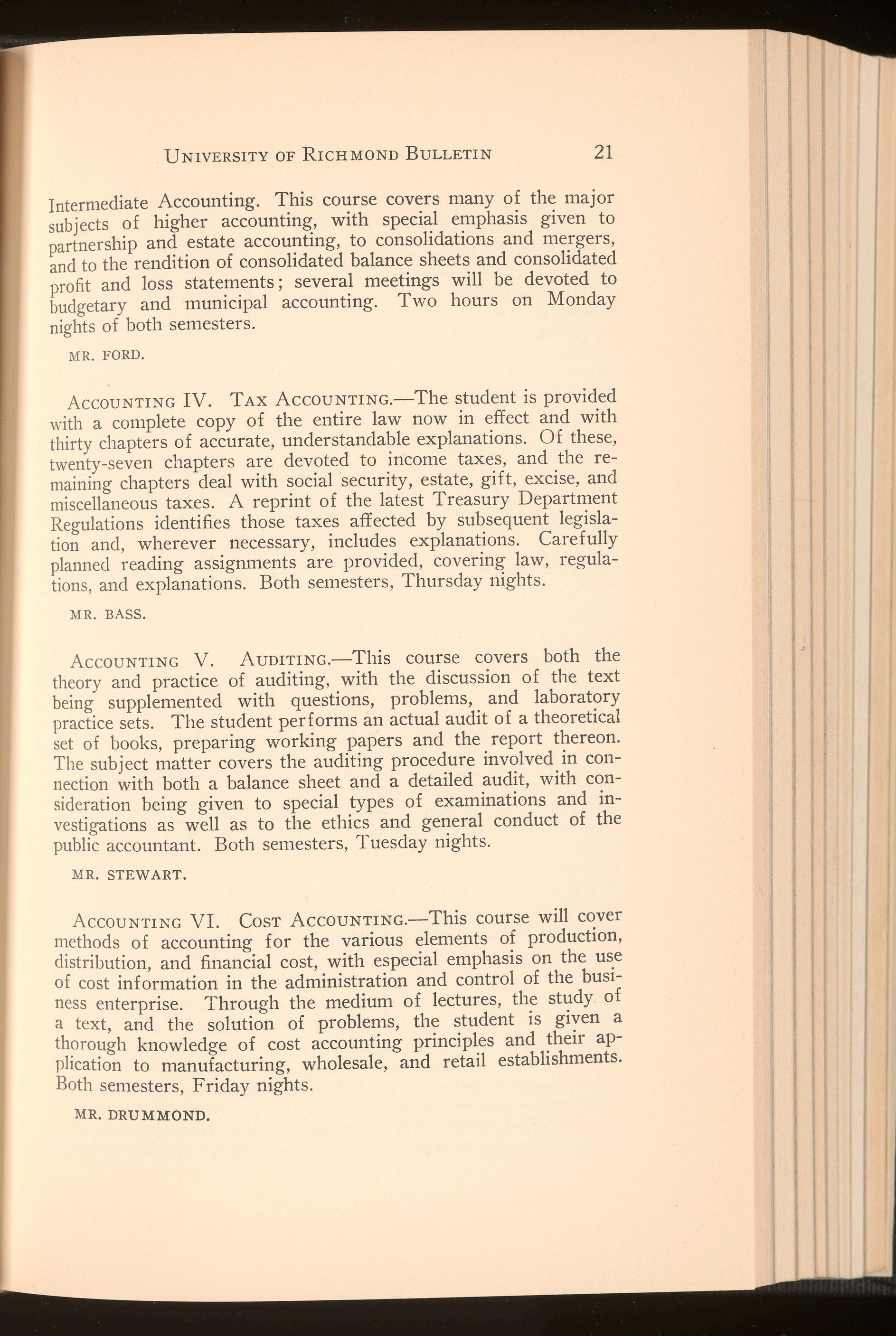
Intermediate Accounting. This course covers many of the major subjects of higher accounting, with special emphasis given to partnership and estate accounting, to consolidations and mergers, and to the rendition of consolidated balance sheets and consolidated profit and loss statements; several meetings will be devoted to budgetary and municipal accounting. Two hours on Monday nights of both semesters.
MR. FORD.
AccouNTING IV. TAx AccouNTING.-The student is provided with a complete copy of the entire law now in effect and with thirty chapters of accurate, understandable explanations. Of these, twenty-seven chapters are devoted to income taxes, and the remaining chapters deal with social security, estate, gift, excise, and miscellaneous taxes. A reprint of the latest Treasury Department Regulations identifies those taxes affected by subsequent legislation and, wherever necessary, includes explanations. Carefully planned reading assignments are provided, covering law, regulations, and explanations. Both semesters, Thursday nights.
MR. BASS.
AccouNTING V. AuDITING.-This course covers both the theory and practice of auditing, with the discussion of the text being supplemented with questions, problems, and laboratory practice sets. The student performs an actual audit of a theoretical set of books, preparing working papers and the report thereon. The subject matter covers the auditing procedure involved in connection with both a balance sheet and a detailed audit, with consideration being given to special types of examinations and investigations as well as to the ethics and general conduct of the public accountant. Both semesters, Tuesday nights.
MR. STEWART.
AccouNTING VI. CosT AccouNTING.-This course will cover methods of accounting for the various elements of production, distribution, and financial cost, with especial emphasis on the u~e of cost information in the administration and control of the business enterprise. Through the medium of lectures, the study of a text, and the solution of problems, the student is given a thorough knowledge of cost accounting principles and their application to manufacturing, wholesale, and retail establishments. Both semesters, Friday nights.
MR. DRUMMOND.
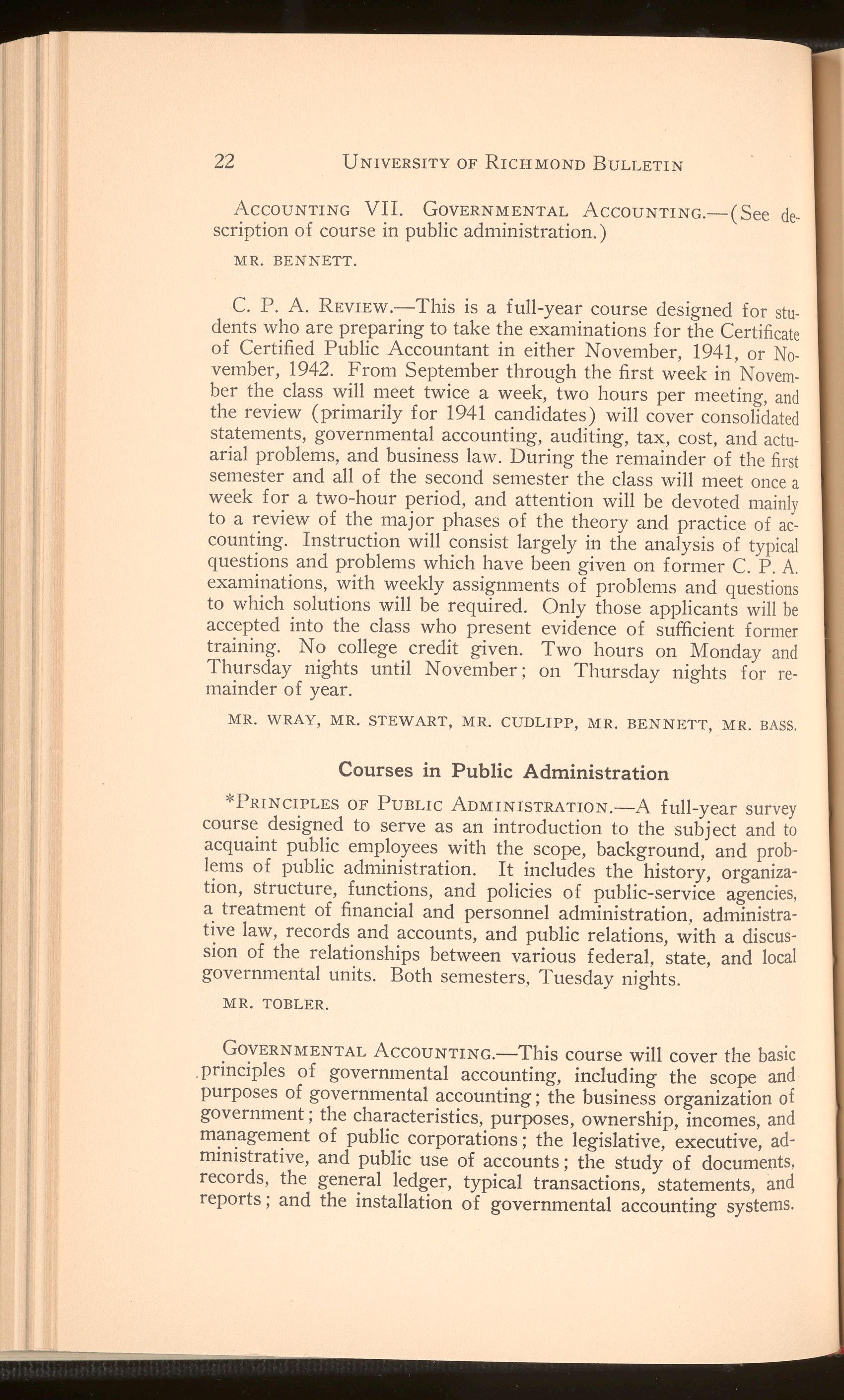
AccouNTING VII. GOVERNMENTALAccouNTING.-(See description of course in public administration.)
MR. BENNETT.
C. P. A. REVIEW.-This is a full-year course designed for students who are preparing to take the examinations for the Certificate of Certified Public Accountant in either November, 1941, or November, 1942. From September through the first week in November the class will meet twice a week, two hours per meeting, and the review (primarily for 1941 candidates) will cover consolidated statements, governmental accounting, auditing, tax, cost, and actuarial problems, and business law. During the remainder of the first semester and all of the second semester the class will meet once a week for a two-hour period, and attention will be devoted mainly to a review of the major phases of the theory and practice of accounting. Instruction will consist largely in the analysis of typical questions and problems which have been given on former C. P. A. examinations, with weekly assignments of problems and questions to which solutions will be required. Only those applicants will be accepted into the class who present evidence of sufficient former training. No college credit given. Two hours on Monday and Thursday nights until November; on Thursday nights for remainder of year.
MR. WRAY,MR. STEWART,MR. CUDLIPP,MR. BENNETT,MR. BASS.
*PRINCIPLESOF PUBLIC ADMINISTRATION.-A full-year survey course designed to serve as an introduction to the subject and to acquaint public employees with the scope, background, and prob- lems of public administration. It includes the history, organiza- tion, structure, functions, and policies of public-service agencies, a treatment of financial and personnel administration, administra- tive law, records and accounts, and public relations, with a discus- sion of the relationships between various federal, state, and local governmental units. Both semesters, Tuesday nights.
MR. TOBLER.
GovERNMENTALAccoUNTING.-This course will cover the basic .principles of governmental accounting, including the scope and purposes of governmental accounting; the business organization of government; the characteristics, purposes, ownership, incomes, and management of public corporations; the legislative, executive, administrative, and public use of accounts; the study of documents, records, the general ledger, typical transactions, statements, and reports; and the installation of governmental accounting systems.
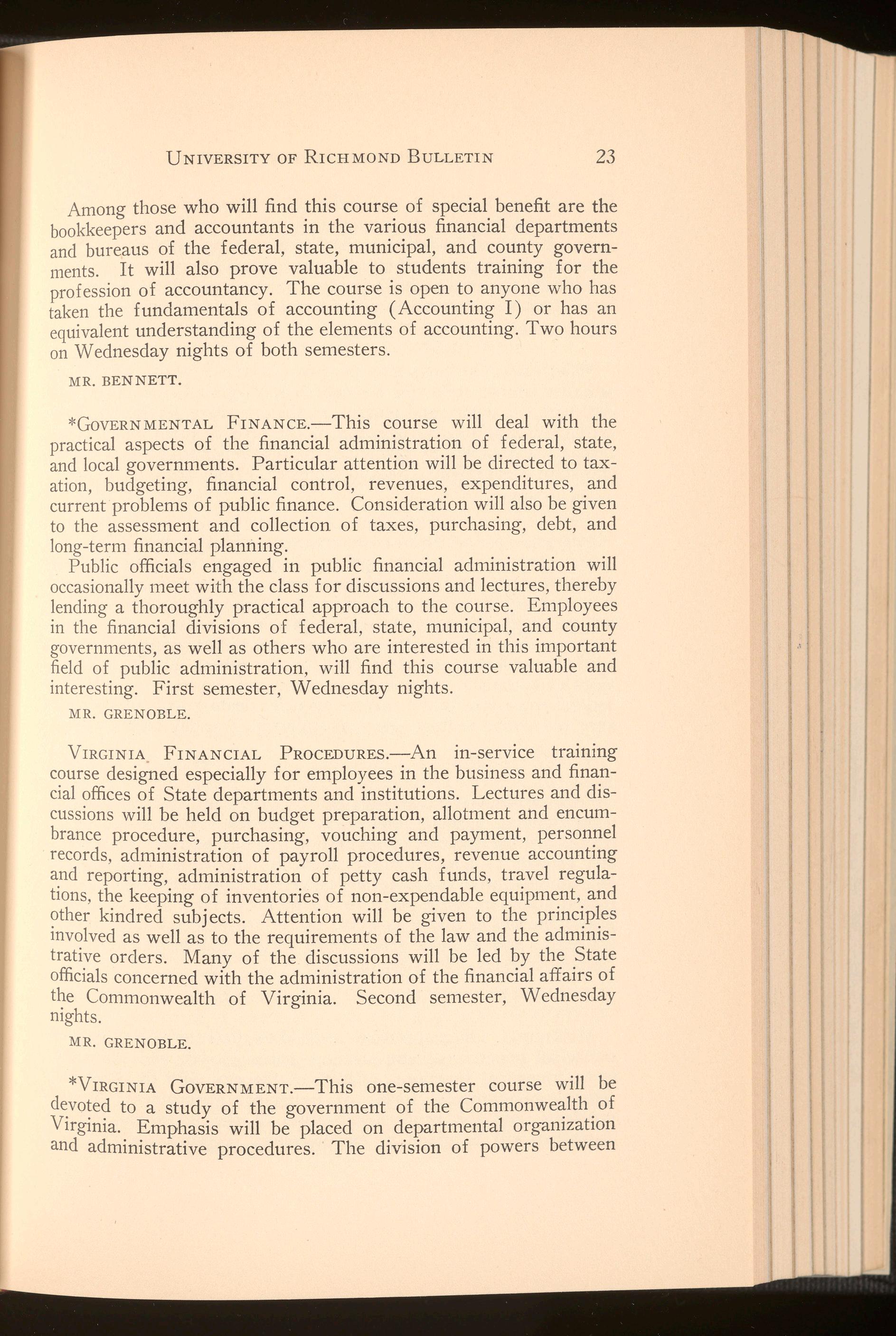
Among those who will find this course of special benefit are the bookkeep er s and accountants in the various financial departments and bu r eaus of the federal, state, municipal, and county governments. It will also prove valuable to students training for the profess ion of accountancy. The course is open to anyone who has taken th e fundamentals of accounting ( Accounting I) or has an equivalent understanding of the elements of accounting. Two hours on We dnesd a y nights of both semesters.
MR.BENNETT.
*GovERNMENTAL FINANCE.-This course will deal with the practical a spects of the financial administration of federal, state , and local gov ernments. Particular attention will be directed to taxation , bud g eting, financial control, revenues, expenditures , and curre nt p roblems of public finance. Consid e ration will also b e given to t he a ssess ment and collection of taxes, purchasing, debt, and long-t er m financial planning.
Pub lic officials engaged in public financial administration will occasiona lly meet with the class for discussion s and lectures , thereby lendin g a thoroughly practical approach to the course. Employees in t he financial divisions of federal, state, municipal , and county governm ent s, as w ell as others who are interested in this important field of p ublic administration, will find this course valuable and interesting. First semester , Wednesday nights.
MR . GRENOBLE.
VIRGINIA FINANCIAL PROCEDUREs.-An in-service trammg cour se designed especially for employees in the business and financial offices of State departments and institutions. Lecture s and discussion s will be held on budget preparation, allotment and encumbr ance proc edure , purchasing, vouching and payment , personnel r ecords, administration of payroll procedures, revenue accounting and re porting, administration of petty cash funds, travel regulations, the keeping of inventories of non-expendable equipment , and other kindred subjects. Attention will be given to the principles involved as well as to the requirements of the law and the administrat ive orders Many of the discussions will be led by the State officials concern ed with the administration of the financial affairs of the Commonwealth of Virginia. Second semester , Wednesday night s.
MR. GRENOBLE.
*VIRGINIA GovERNMENT.-This one-semester course will be d~vo!e? to a study of the government of the Commonwe~lth. of V irg1111a.Emphasis will be placed on departmental orgarnzatton and administrative procedures. The division of powers between
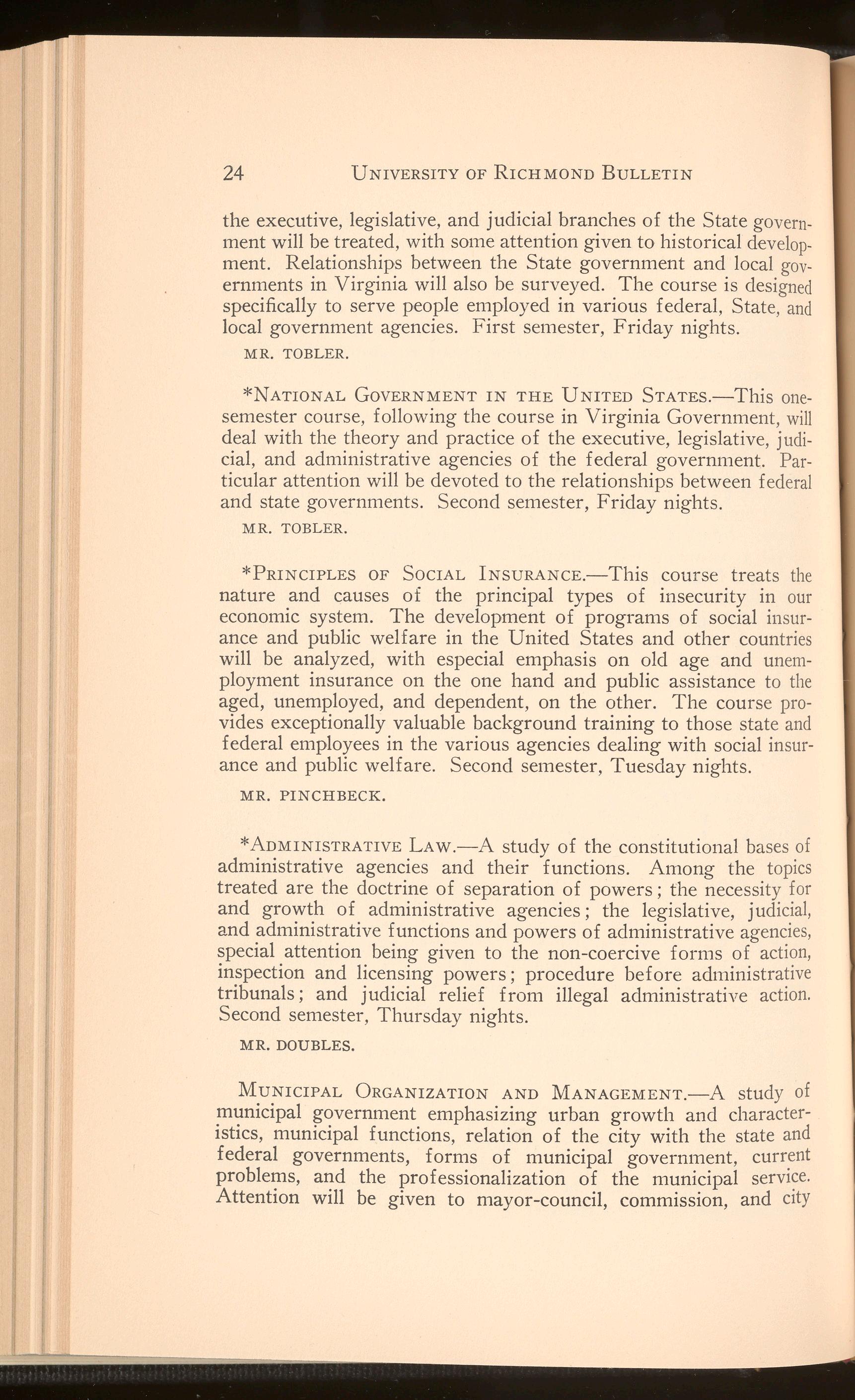
the executive, legislative, and judicial branches of the State government will be treated, with some attention given to historical development. Relationships between the State government and local governments in Virginia will also be surveyed. The course is designed specifically to serve people employed in various federal, State, and local government agencies. First semester, Friday nights.
MR. TOBLER.
*NATIONALGovERNMENTIN THE UNITED STATES.-This onesemester course, following the course in Virginia Government, will deal with the theory and practice of the executive, legislative, judicial, and administrative agencies of the federal government. Particular attention will be devoted to the relationships between federal and state governments. Second semester, Friday nights.
MR. TOBLER.
*PRINCIPLES OF SOCIAL INSURANCE.-This course treats the nature and causes of the principal types of insecurity in our economic system. The development of programs of social insurance and public welfare in the United States and other countries will be analyzed, with especial emphasis on old age and unemployment insurance on the one hand and public assistance to the aged, unemployed, and dependent, on the other. The course provides exceptionally valuable background training to those state and federal employees in the various agencies dealing with social insurance and public welfare. Second semester, Tuesday nights.
MR. PINCHBECK-
*ADMINISTRATIVELAw.-A study of the constitutional bases of administrative agencies and their functions. Among the topics treated are the doctrine of separation of powers; the necessity for and growth of administrative agencies; the legislative, judicial, and administrative functions and powers of administrative agencies, special attention being given to the non-coercive forms of action, inspection and licensing powers; procedure before administrative tribunals; and judicial relief from illegal administrative action. Second semester, Thursday nights.
MR. DOUBLES.
MUNICIPAL ORGANIZATIONAND MANAGEMENT.-A study of municipal government emphasizing urban growth and characteristics, municipal functions, relation of the city with the state and federal governments, forms of municipal government, curr~nt problems, and the professionalization of the municipal service. Attention will be given to mayor-council, commission, and city

manager plans, personnel administration, taxation and finance, bonded indebtedness, purchasing, planning, zoning, housing, and the major activities of municipal government such as public safety, public welfar~, public healt~, utiliti_e~, educati?1~ and_ recre'.1-tion.
Public officials engaged m mumc1pal admm1strat1on will meet with the class from time to time for discussions and lectures, thereby lending a thoroughly practical approach to the course. Second semester, Tuesday nights, if demand is sufficiently large.
MR.BAUMES.
REPORTINGAND PUBLIC RELATIONs.-This course deals with the practical problems of public reporting and the preparation of governmental reports, including composition and content, editing, proofreading and indexing, illustrating, and publication of such reports. Attention is given to the principal types of reports generally issued by governmental units, such as internal administrative reports, periodic departmental reports, and newspaper releases, with a critical study of the purposes served by these reports. An attempt will be made to formulate standards of measurement or valuation by which reports may be judged, and emphasis throughout the course will be on means of improving the types of reports now issued by most governmental agencies, particularly in the Commonwealth of Virginia. (Not offered in 1941-42.)
C. L. U. COURSEA. FUNDAMENTALPRINCIPLES OF LIFE INSURANCE.-This course provides an intensive survey of the basic principles of life insurance, the economies of life insurance, and the practices of life insurance. It prepares the student for Part A of the C. L. U. examinations. Two hours on Thursday nights of both semesters.
MR.VADEN,MR. HAWKINS,ANDMR. KNIGHT.
C. L. U. CouRsE B. GENERALINSURANCEEDUCATION.-This c~mrseprepares the student for Part B of the C. L. U. examinations. It includes the study of economics, government, and sociology, and provides the student of life insurance with that general education which is so essential to an intelligent analysis of life insurance problems. Both semesters, Monday nights.
MR.MODLIN,MR. MCDANEL,ANDMR. CARVER.
C. L. U. COURSEC. LIFE INSURANCELAw.-This course prepares the student for Part C of the C. L. U. examinations. It contains (a) the fundamental concepts of commercial law applied to
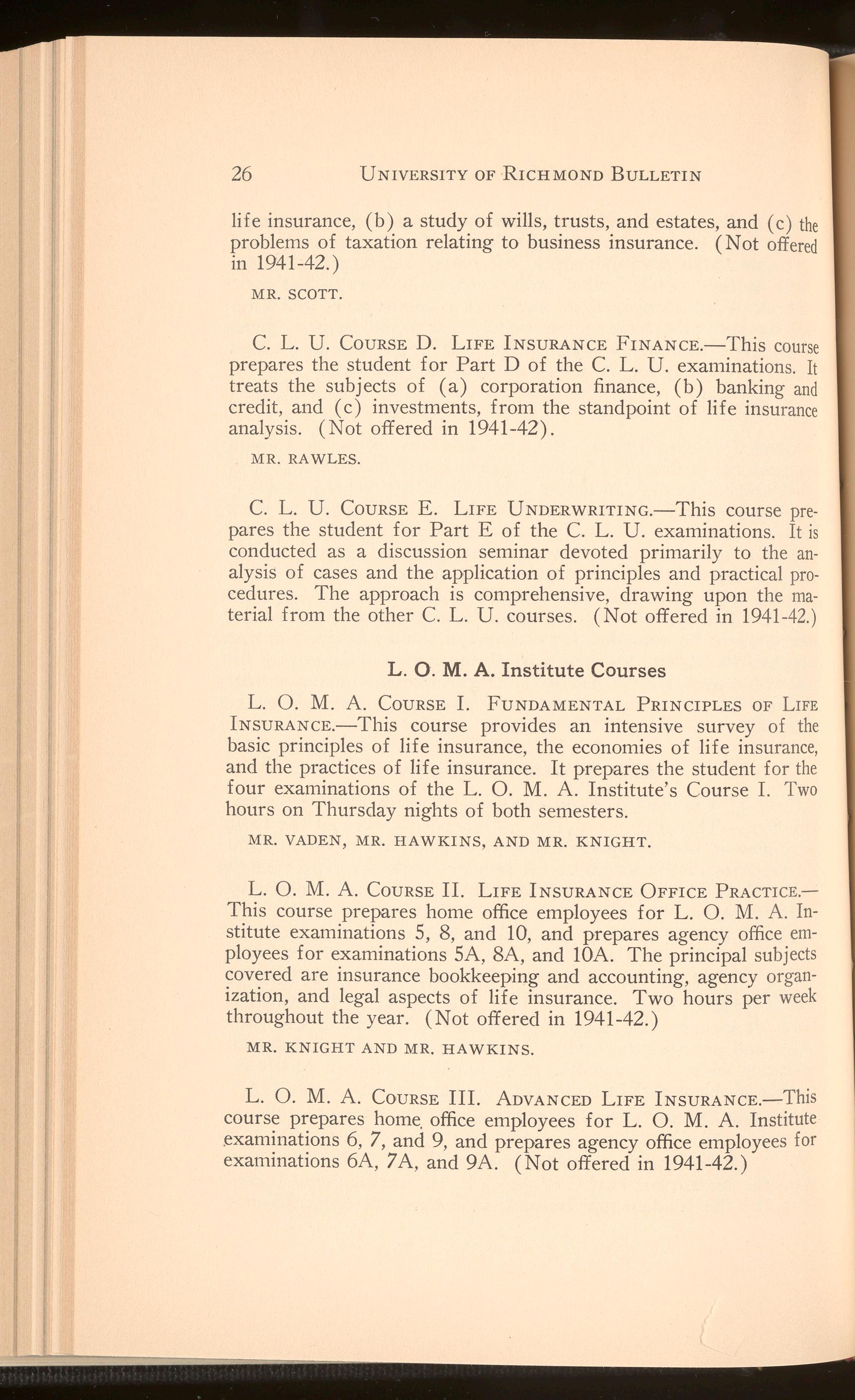
life insurance, (b) a study of wills, trusts, and estates, and (c) the problems of taxation relating to business insurance. (Not offered in 1941-42.)
MR. SCOTT.
C. L. U. CouRsE D. LIFE INSURANCEFINANCE.-This course prepares the student for Part D of the C. L. U. examinations. It treats the subjects of (a) corporation finance, (b) banking and credit, and ( c) investments, from the standpoint of life insurance analysis. (Not offered in 1941-42).
MR. RAWLES.
C. L. U. COURSEE. LIFE UNDERWRITING.-This course prepares the student for Part E of the C. L. U. examinations. It is conducted as a discussion seminar devoted primarily to the analysis of cases and the application of principles and practical procedures. The approach is comprehensive, drawing upon the material from the other C. L. U. courses. (Not offered in 1941-42.)
L. 0. M. A. COURSEI. FUNDAMENTALPRINCIPLES OF LIFE INSURANCE.-This course provides an intensive survey of the basic principles of life insurance, the economies of life insurance, and the practices of life insurance. It prepares the student for the four examinations of the L. 0. M. A. Institute's Course I. Two hours on Thursday nights of both semesters.
MR. VADEN,MR. HAWKINS,ANDMR. KNIGHT.
L. 0. M. A. COURSEII. LIFE INSURANCEOFFICE PRACTICE.This course prepares home office employees for L. 0. M. A. Institute examinations 5, 8, and 10, and prepares agency office employees for examinations SA, 8A, and lOA. The principal subjects covered are insurance bookkeeping and accounting, agency organization, and legal aspects of life insurance. Two hours per week throughout the year. (Not offered in 1941-42.)
MR. KNIGHTANDMR. HAWKINS.
L. 0. M. A. CouRSE III. ADVANCEDLIFE INSURANCE.-This course prepares home . office employees for L. 0. M. A. Institute examinations 6, 7, and 9, and prepares agency office employees for examinations 6A, 7A, and 9A. (Not offered in 1941-42.)
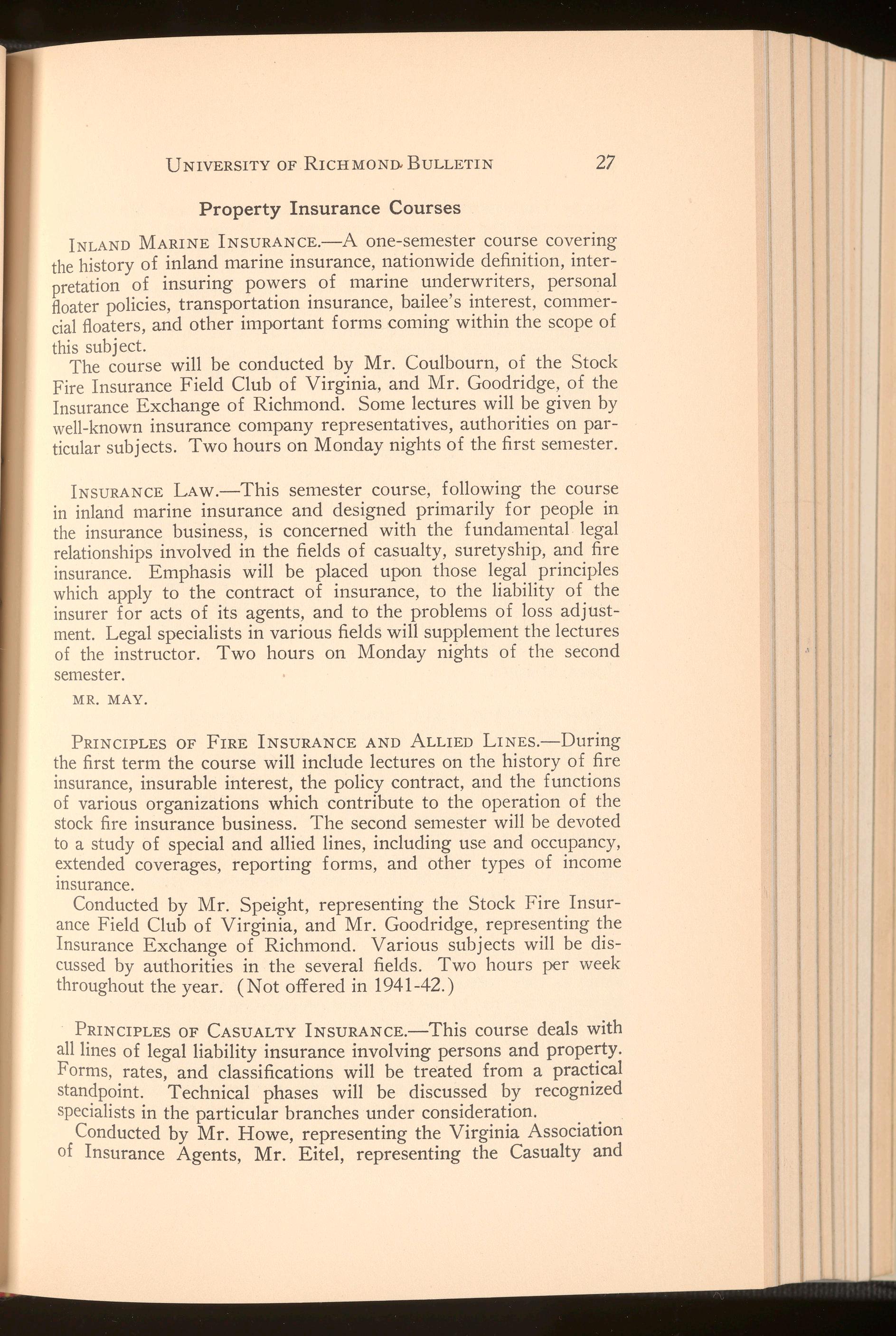
INLANDMARINE INSURANCE.-A one-semester course covering the history of inland marine insurance, nationwide definition, interpretation of insuring powers of marine underwriters, personal floater policies, transportation insurance, bailee's interest, commercial floaters, and other important forms coming within the scope of this subject.
The course will be conducted by Mr. Coulbourn, of the Stock Fire Insurance Field Club of Virginia, and Mr. Goodridge, of the Insurance Exchange of Richmond. Some lectures will be given by well-known insurance company representatives, authorities on particular subjects. Two hours on Monday nights of the first semester.
INSURANCELAw.-This semester course, following the course in inland marine insurance and designed primarily for people in the insurance business, is concerned with the fundamental legal relationships involved in the fields of casualty, suretyship, and fire insurance. Emphasis will be placed upon those legal principles which apply to the contract of insurance, to the liability of the insurer for acts of its agents, and to the problems of loss adjustment. Legal specialists in various fields will supplement the lectures of the instructor. Two hours on Monday nights of the second semester.
MR. MAY.
PRINCIPLESOF FIRE INSURANCEAND ALLIED LINES.-During the first term the course will include lectures on the history of fire insurance, insurable interest, the policy contract, and the functions of various organizations which contribute to the operation of the stock fire insurance business. The second semester will be devoted to a study of special and allied lines, including use and occupancy, ~xtended coverages, reporting forms, and other types of income msurance.
Conducted by Mr. Speight, representing the Stock Fire Insurance Field Club of Virginia, and Mr. Goodridge, representing the Insurance Exchange of Richmond. Various subjects will be discussed by authorities in the several fields. Two hours per week throughout the year. (Not offered in 1941-42.)
PRINCIPLESOF CASUALTYlNSURANCE.-This course deals with all lines of legal liability insurance involving persons and property. Forms, rates, and classifications will be treated from a practical standpoint. Technical phases will be discussed by recognized specialists in the particular branches under consideration.
Conducted by Mr. Howe, representing the Virginia Association of Insurance Agents, Mr. Eitel, representing the Casualty and

Surety Underwriters' Association of Virginia, and Mr. Curtis, representing the Insurance Exchange of Richmond. Two hours per week throughout the year. (Not offered in 1941-42.)
one-semester course dealing with the various kinds of fidelity and surety bonds, including the principles of suretyship, the history of corporate suretyship, under- writing and rating principles, and the part played by suretyship in our present economic system. Two hours per week. (Not offered in 1941-42.)
MR.CURTIS.
for owners and employees of retail stores, this course deals with prac- tical merchandising problems, policies, and procedures of various types of retail stores. Attention is given, among other things, to store organization and arrangement, buying, marking, planning and control, selling, display, salesmanship, personnel administra- tion and training. Lectures and class discussions will be supple- mented with talks by retail store executives and specialists. (Not offered in 1941-42.) ·
MRS.RUSSELL.
SALESMANSHIP.-The principles and technique of personal selling are treated from a practical standpoint, with emphasis on sales psychology, motivation, and presentation. Typical selling situations and problems confronting salesmen are analyzed, and students participate in realistic sales demonstrations. The relation- ships between the salesmen and other departments of a business organization are discussed. An understanding of the principles of salesmanship, while absolutely necessary for salesmen and sales managers, is valuable in almost every business position. Both se- mesters, Friday nights.
MR. CHRISTEN.
ADVERTISING.-This course covers modern principles of adver- tising as they relate to local and national advertising. Special at- tention is directed to the study and preparation of local advertising, with emphasis on copy, layout, and general typography. All classes of advertising media are treated, including magazine, newspaper , trade paper, billboard, radio, and direct mail. Field trips are made to advertising offices, newspaper plants, outdoor advertising plants, printing establishments, and radio stations. Both semesters, Wed- nesday nights.
MR. HALL.
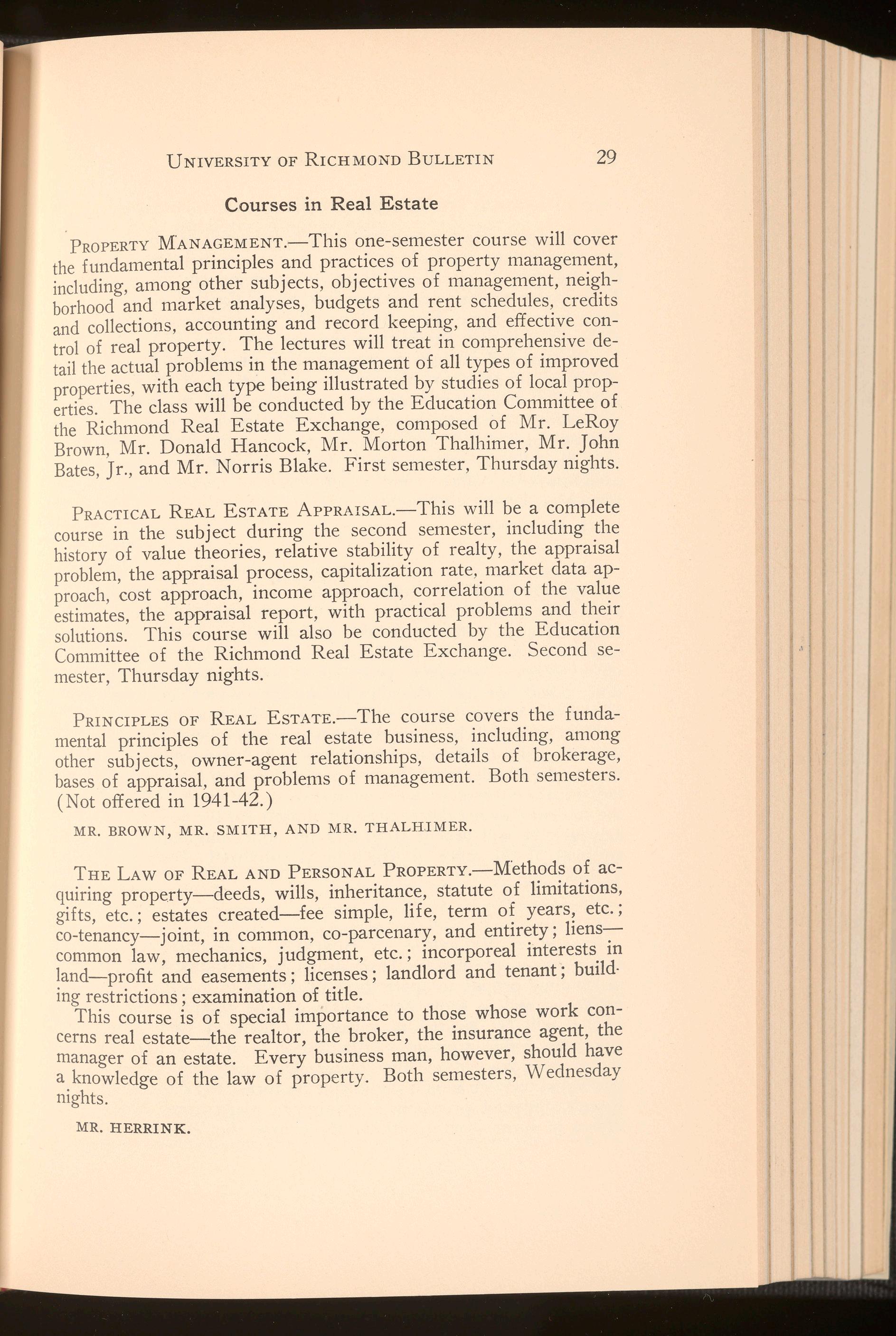
Courses in Real Estate
PROPERTYM'ANAGEMENT.-This one-semester course will cover the fundamenta l principles and practices of property management, including, among other subjects, objectives of management, neighborhood and market analyses, budgets and rent schedules, credits and collections, accounting and record keeping, and effective control of real property. The lectures will treat in comprehensive detail the actua l problems in the management of all types of improved properties, with each type being illustrated by studies of local properties. The class will be conducted by the Education Committee of the Richmond Real Estate Exchange, composed of Mr. LeRoy Brown, Mr. Donald Hancock, Mr. Morton Thalhimer, Mr. John Bates, Jr., and Mr. Norris Blake. First semester, Thursday nights.
PRACTICALREAL ESTATE APPRAISAL.-This will be a complete course in the subject during the second semester, including the history of value theories, relative stability of realty, the appraisal problem, the appraisal process, capitalization rate, market data approach, cost approach, income approach, correlation of the value estimates, the appraisal report, with practical problems and their solutions. This course will also be conducted by the Education Committee of the Richmond Real Estate Exchange. Second semester, Thursday nights.
PRINCIPLESOF REAL EsTATE.-The course covers the fundamental principles of the real estate business, including, among other subjects, owner-agent relationships, details of brokerage, bases of appraisal, and problems of management. Both semesters. (Not offered in 1941-42.)
MR.BROWN,MR. SMITH, ANDMR. THALH.IMER.
THE LAW OF REAL AND PERSONALPROPERTY.-Methods of acquiring property-deeds, wills, inheritance, statute of limitations, gifts, etc.; estates created-fee simple, life, term of years, etc.; co-tenancy-joint, in common, co-parcenary, and entirety; lienscommon law, mechanics, judgment, etc.; incorporeal interests in land-profit and easements ; licenses; landlord and tenant; building restrictions ; examination of title.
This course is of special importance to those whose work concerns real estate-the realtor, the broker, the insurance agent, the manager of an estate. Every business man, however, should have a_knowledge of the law of property. Both semesters, ·wednesday mghts.
MR.HERRINK.
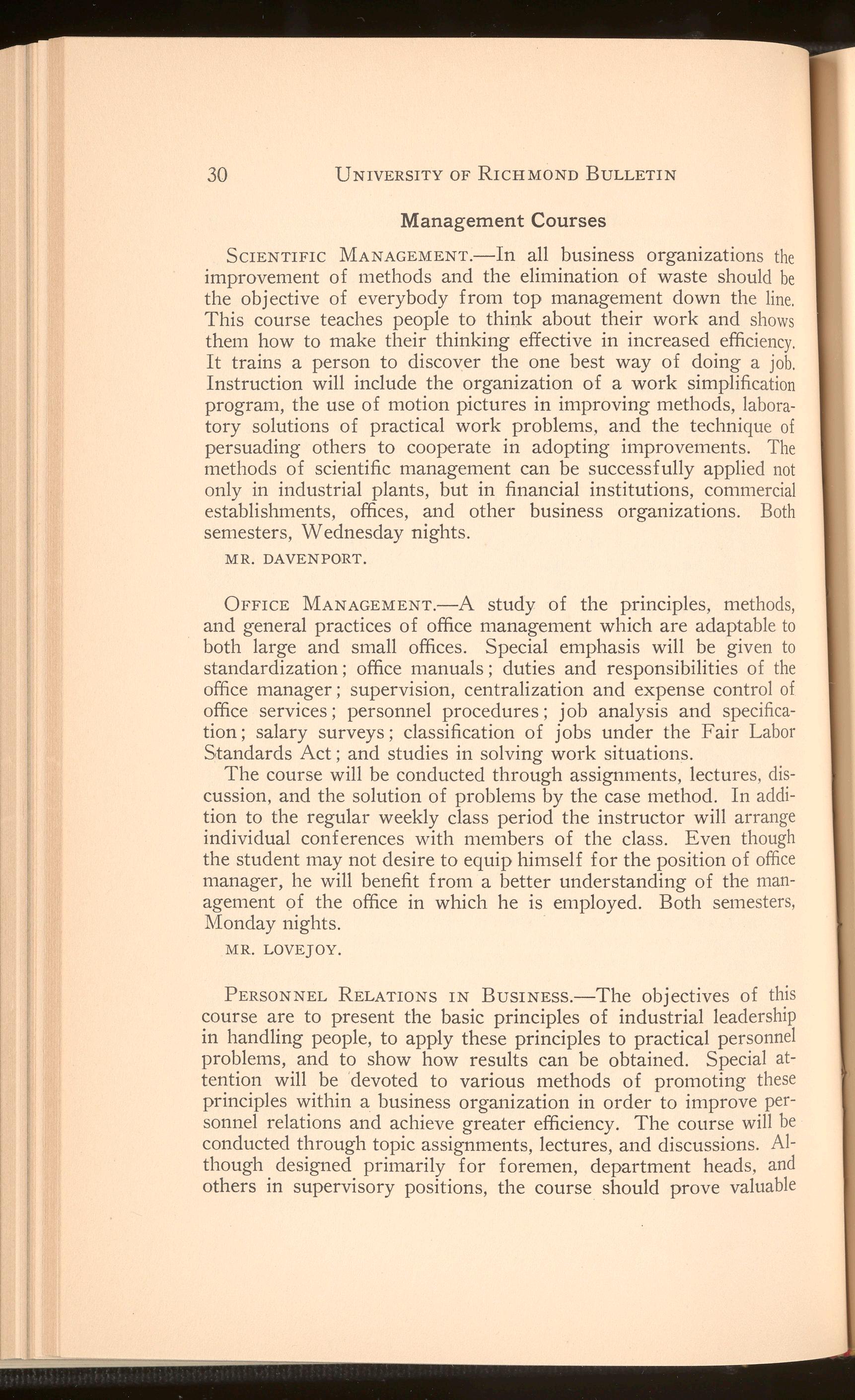
SCIENTIFIC MANAGEMENT.-In all business organizations the improvement of methods and the elimination of waste should be the objective of everybody from top management down the line. This course teaches people to think about their work and shows them how to make their thinking effective in increased efficiency. It trains a person to discover the one best way of doing a job. Instruction will include the organization of a work simplification program, the use of motion pictures in improving methods, laboratory solutions of practical work problems, and the technique of persuading others to cooperate in adopting improvements. The methods of scientific management can be successfully applied not only in industrial plants, but in financial institutions, commercial establishments, offices, and other business organizations. Both semesters, Wednesday nights.
MR. DAVENPORT.
OFFICE MANAGEMENT.-A study of the principles, methods, and general practices of office management which are adaptable to both large and small offices. Special emphasis will be given to standardization; office manuals; duties and responsibilities of the office manager; supervision, centralization and expense control of office services; personnel procedures; job analysis and specification; salary surveys; classification of jobs under the Fair Labor Standards Act; and studies in solving work situations.
The course will be conducted through assignments, lectures, discussion, and the solution of problems by the case method. In addition to the regular weekly class period the instructor will arrange individual conferences with members of the class. Even though the student may not desire to equip himself for the position of office manager, he will benefit from a better understanding of the management of the office in which he is employed. Both semesters, lVIonday nights.
MR. LOVEJOY.
PERSONNELRELATIONSIN BusINESs.-The objectives of this course are to present the basic principles of industrial leadership in handling people, to apply these principles to practical personnel problems, and to show how results can be obtained. Special attention will be 'devoted to various methods of promoting these principles within a business organization in order to improve personnel relations and achieve greater efficiency. The course will be conducted through topic assignments, lectures, and discussions. Although designed primarily for foremen, department heads, and others in supervisory positions, the course should prove valuable
to all who are interested in improving personnel relations m any business. Both semesters, Tuesday nights.
MR.MACDONALD.

*CORPORATIONFINANCE.- This course deals with the financial problems confronting business men as a result of the growth of the corporate form of business. It includes the study of the place of the corporation in modern business, advantages and disadvantages of corporate organizations, legal organization, corporate promotion, capitalization, types of securities, earnings, expenses and surplus, insolvency and reorganization. Special emphasis will be given to changing conditions and to new problems arising under the Securities and Exchange Commission. Both semesters, Friday nights.
MR MILLER.
*BUSINESSFINANCE.-This is a seminar course designed primarily for graduate studentst and devoted to a study of the financial system of the United States. Investigation is directed into three broad fields: first, a historical survey of the financial system with emphasis upon money, bank credit, and prices; second, an examination of the organization and operation of modern financial institutions and the services offered by them to business men; and third, a discussion of financial legislation of the last quarter century and its effects upon the business system. Graduate credit of six semester hours. Both semesters. (Not offered in 1941-42.)
MR.THOMAS.
INSURANCEPRINCIPLES AND PRACTICEs.-This course is presented from the standpoint of the purchaser of insurance and contains a general analysis of the principal forms of insurance with which the business man and woman should be familiar, including life, accident, health, fire, compensation, liability, automobile, title, corporate bonding, etc.
The primary objective of the class is to aid the buyer of insurance, as most students of business will be on the buying rather than the selling end of insurance transactions. Accordingly, while th~ basic fundamentals of premium making and other technical pomts are not ignored, the class will be principally concerned with an an~lysis of the policy provisions of the various types of insur~nce, mcluding the rights and liabilities of both the insurer and the msured. An explanation will be given to the sundry clauses that h tAdvanced undergraduate students may be admitted upon approval of the director of t e School.
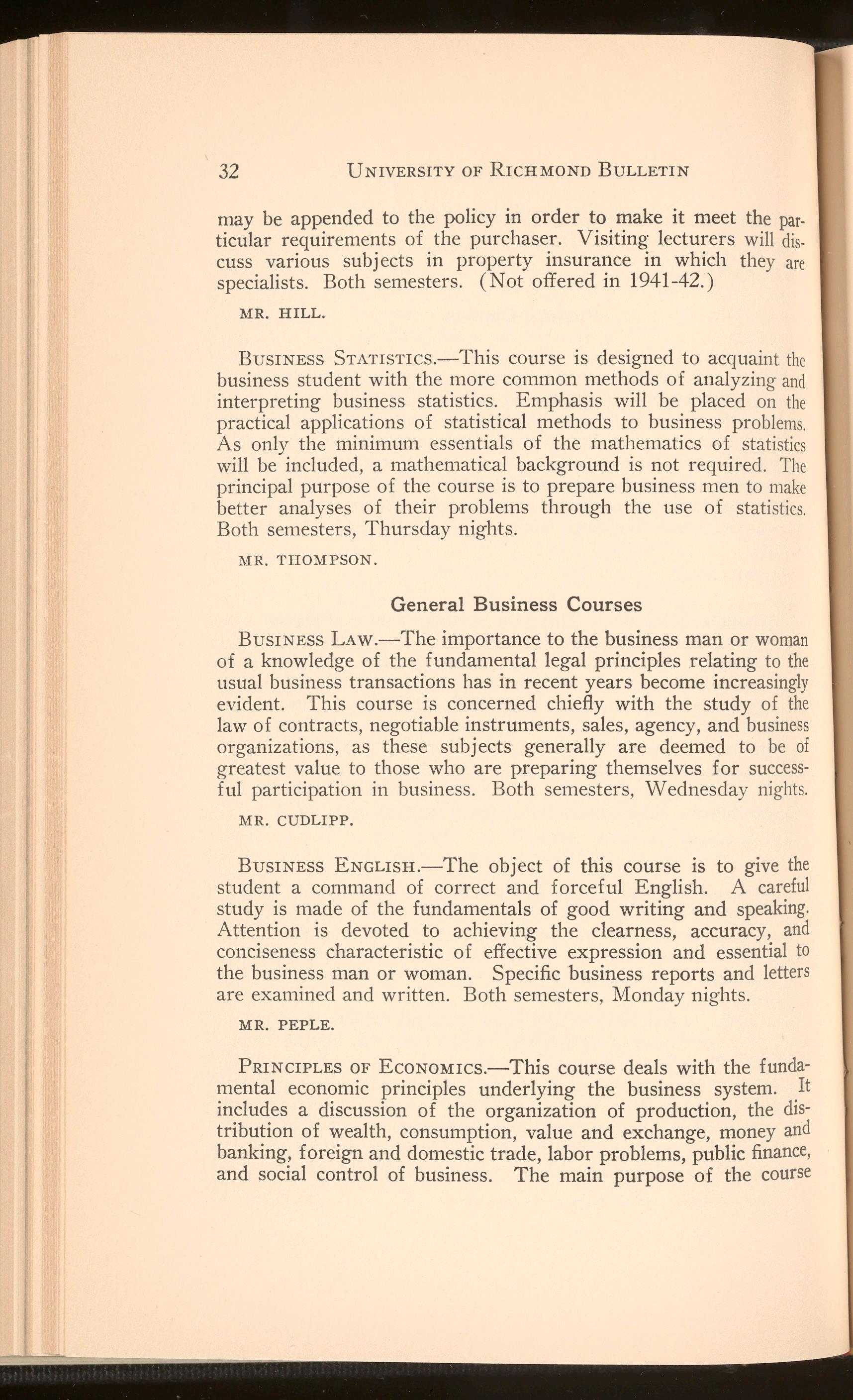
may be appended to the policy in order to make it meet the particular requirements of the purchaser. Visiting lecturers will discuss various subjects in property insurance in which they are specialists. Both semesters. (Not offered in 1941-42.)
MR. HILL
BusINESS STATISTics.-This course is designed to acquaint the business student with the more common methods of analyzing and interpreting business statistics. Emphasis will be placed on the practical applications of statistical methods to business problems. As only the minimum essentials of the mathematics of stati stics will be included, a mathematical background is not required. The principal purpose of the course is to prepare business men to make better analyses of their problems through the use of stati stics Both semesters, Thursday nights.
MR . THOMPSON.
BusINESS LAw.-The importance to the business man or woman of a knowledge of the fundamental legal principles relating to the usual business transactions has in recent years become increasingly evident. This course is concerned chiefly with the study of the law of contracts, negotiable instruments, sales, agency, and business organizations, as these subjects generally are deemed to be of greatest value to those who are preparing themselves for successful participation in business. Both semesters , ·Wednesday nights.
MR. CUDLIPP .
BusINESS ENGLISH.-The object of this course is to give the student a command of correct and forceful English. A careful study is made of the fundamentals of good writing and speaking. Attention is devoted to achieving the clearness, accuracy, and conciseness characteristic of effective expression and essential to the business man or woman. Specific business reports and letters are examined and written. Both semesters, Monday nights
MR. PEPLE.
PRINCIPLESOF EcoNOMics.-This course deals with the fundamental economic principles underlying the business system. It includes a discussion of the organization of production, the distribution of wealth, consumption, value and exchange, money and banking, foreign and domestic trade, labor problems, public finance, and social control of business. The main purpose of the course
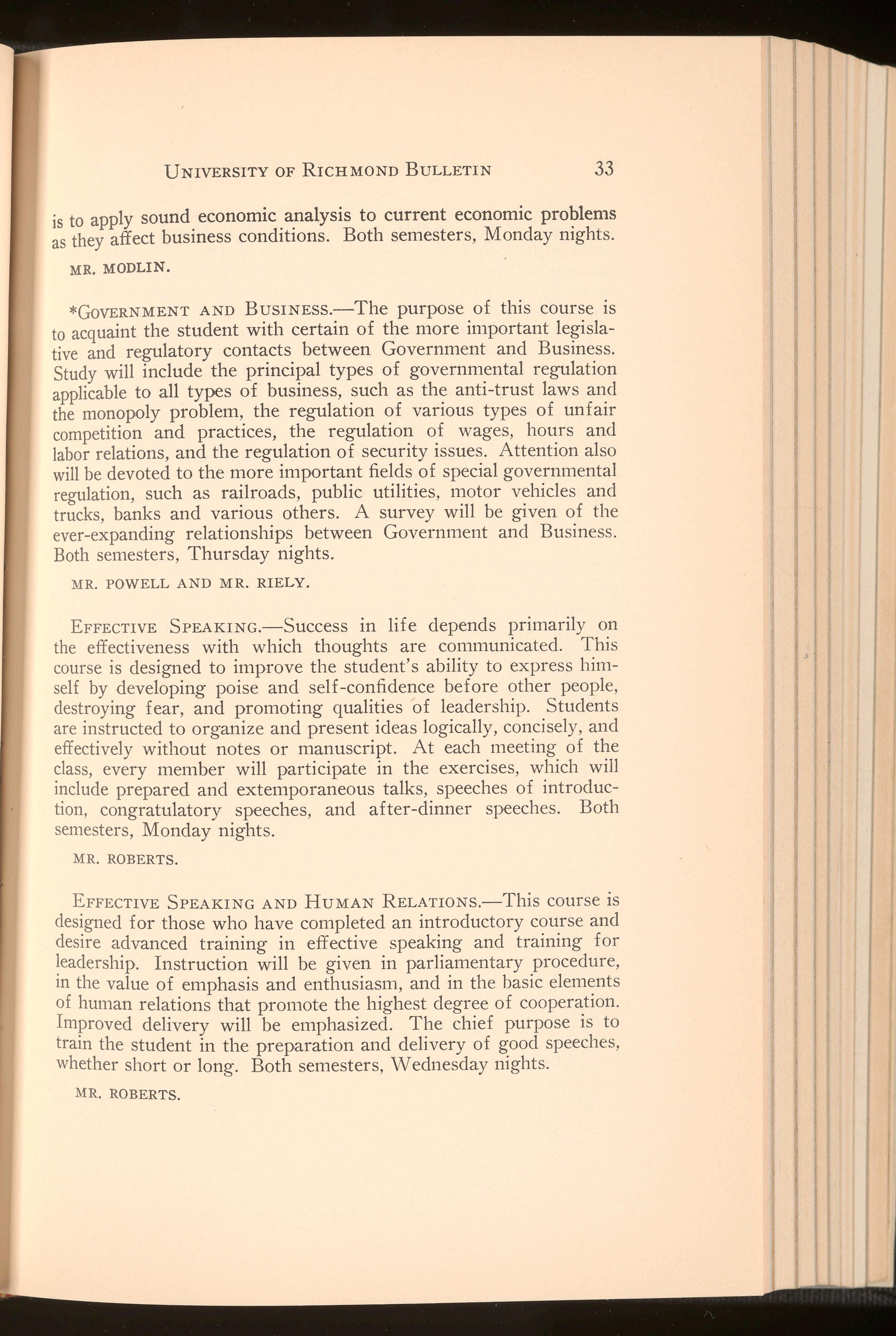
is to apply sound economic analysis to current economic problems as they affect business conditions. Both semesters, Monday nights.
MR. MODLIN.
*GOVERNMENTAND BusINEss.-The purpose of this course is to acquaint the student with certain of the more important legislative and regulatory contacts between Government and Business. Study will include the principal types of governmental regulation applicable to all types of business, such as the anti-trust laws and the monopoly problem, the regulation of various types of unfair competition and practices, the regulation of wages, hours and labor relations, and the regulation of security issues. Attention also will be devoted to the more important fields of special governmental regulation, such as railroads, public utilities, motor vehicles and trucks, banks and various others. A survey will be given of the ever-expanding relationships between Government and Business. Both semesters, Thursday nights.
MR.POWELLANDMR. RIELY.
EFFECTIVESPEAKING.-Success in life depends primarily on the effectiveness with which thoughts are communicated. This course is designed to improve the student's ability to express himself by developing poise and self-confidence before other people, destroying fear, and promoting qualities of leadership. Students are instructed to organize and present ideas logically, concisely, and effectively without notes or manuscript. At each meeting of the class, every member will participate in the exercises, which will include prepared and extemporaneous talks, speeches of introduction, congratulatory speeches, and after-dinner speeches. Both semesters, Monday nights.
MR.ROBERTS.
EFFECTIVESPEAKINGANDHUMAN RELATIONs.-This course is designed for those who have completed an introductory course and desire advanced training in effective speaking and training for )eadership. Instruction will be given in parliamentary procedure, 111the value of emphasis and enthusiasm, and in the basic elements of human relations that promote the highest degree of cooperation. Improved delivery will be emphasized. The chief purpose is to tram the student in the preparation and delivery of good speeches, whether short or long. Both semesters, vVednesday nights.
MR.ROBERTS.
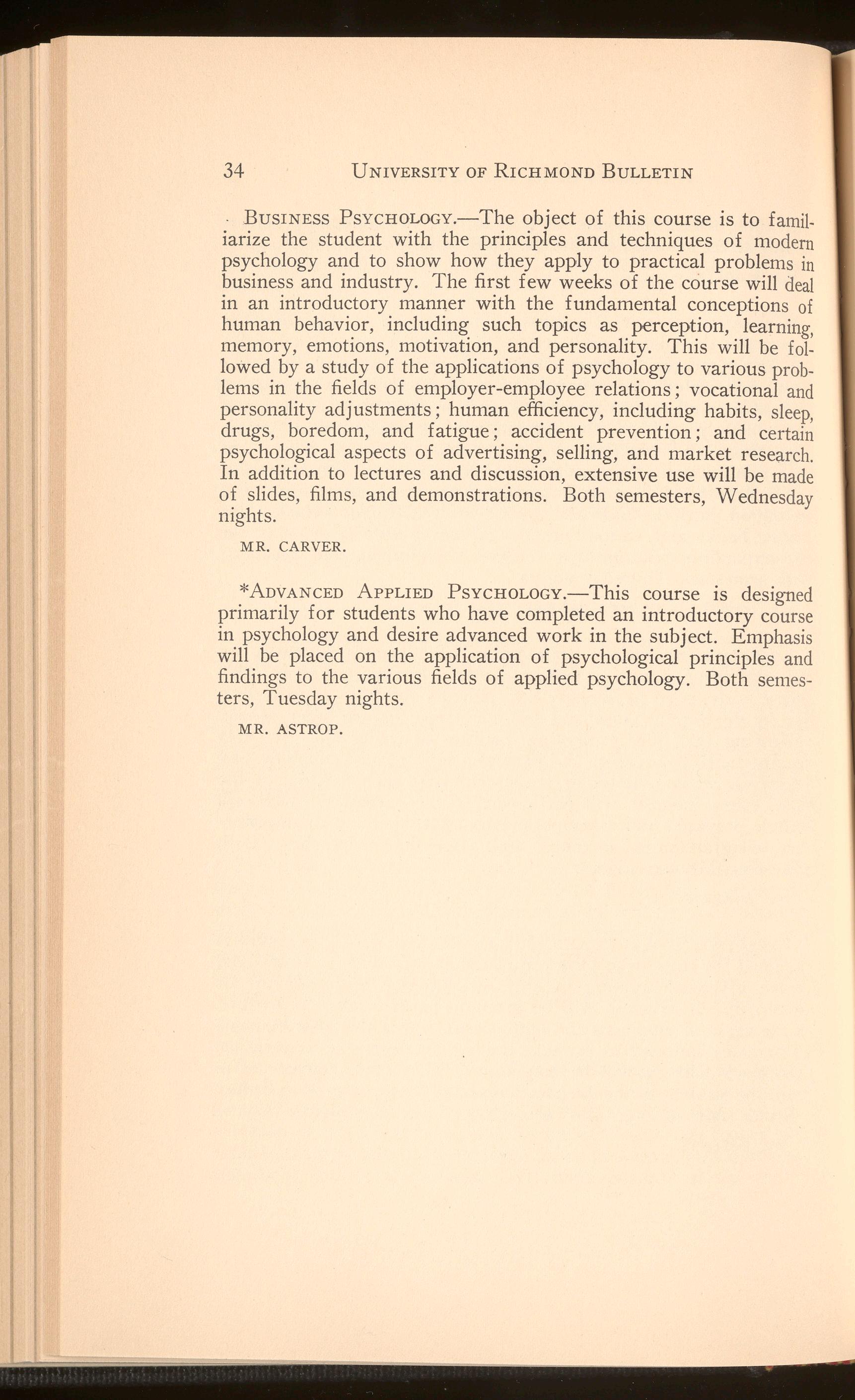
BusINESS PsYCHOLOGY.-The object of this course is to familiarize the student with the principles and techniques of modem psychology and to show how they apply to practical problems in business and industry. The first few weeks of the course will deal in an introductory manner with the fundamental conceptions of human behavior, including such topics as perception, learning, memory, emotions, motivation, and personality. This will be followed by a study of the applications of psychology to various problems in the fields of employer-employee relations; vocational and personality adjustments; human efficiency, including habits, sleep, drugs, boredom, and fatigue; accident prevention; and certain psychological aspects of advertising, selling, and market research. In addition to lectures and discussion, extensive use will be made of slides, films, and demonstrations. Both semesters, Wednesday nights.
MR. CARVER.
*ADVANCEDAPPLIED PsvcHOLOGY.-This course is designed primarily for students who have completed an introductory course in psychology and desire advanced work in the subject. Emphasis will be placed on the application of psychological principles and findings to the various fields of applied psychology. Both semesters, Tuesday nights.
MR. ASTROP.
FRIDAY
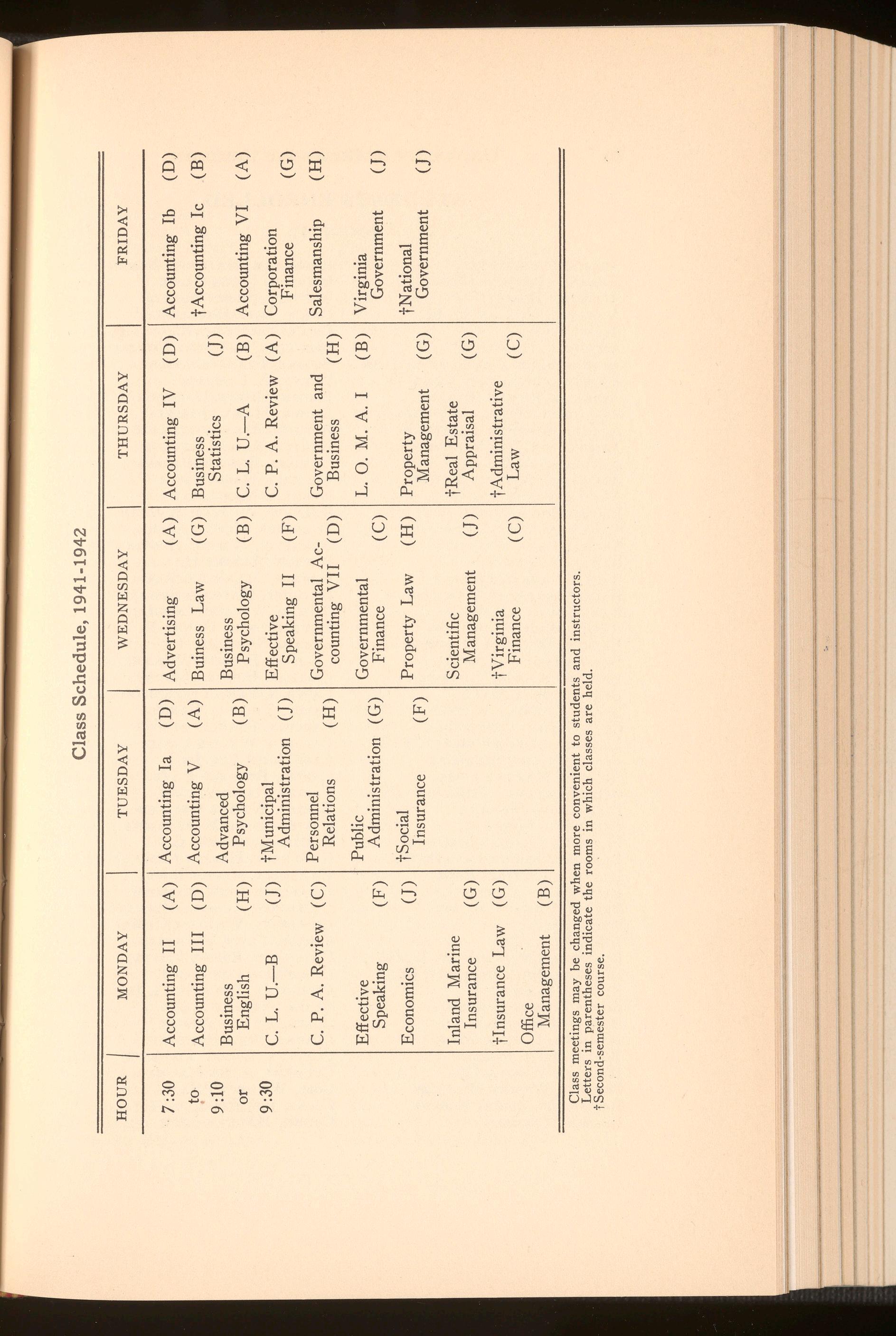
THURSDAY
Accounting lb (D)
Accounting IV (D)
Business t Accounting le (B)
Statistics (J)
Class Schedule, 1941-1942
WEDNESDAY
TUESDAY
MONDAY
HOUR I
7:30 Accounting II (A) Accounting Ia (D) Advertising (A) to Accounting III (D) Accounting V (A)
C. L. U.-A (B) Accounting VI (A) C. P. A. Review (A)
Corporation Finance (G)
Government and Salesmanship (H)
Business (H) L. 0. M.A. I (B) Virginia Government (J)
Buiness Law (G) 9 :10 Business Advanced Business or English (H) Psychology (B) Psychology (B) 9:30 C. L. U.-B (J) tMunicipal
Effective Administration (J) Speaking II (F)
C. P. A. Review (C) Personnel Governmental AcRelations (H) counting VII
Property tNational Management (G) Government (J) t Real Estate Appraisal (G) t Administrative Law (C)
Class meetings may be changed when more convenient to students and instructors. Letters in parentheses indicate the rooms in which classes are held. !Second-semester course. (D) (C) (H) (J) (C)
Effective Public Governmental Speaking (F) Administration (G) Finance Economics CJ) tSocial Property Law Insurance (F)
Inland Marine Scientific Insurance (G) Management tlnsurance Law (G) tVirginiaFinance Office Management (B)
UNIVERSITY OF RICHMOND BULLETIN
1940-1941

ADAMS, JOHN HENRY
AHLADAS, ARTHUR JOHN
ALBRIGHT, ROBERT TAIT
ALDRIDGE, WILLIAM D. K.
ALLEN, Guy P.
ANDERSON, HAYDEN Q.
ANDERSON, LELAND BoERHAAVE, JR.
ANDREWS, MARGARET VIRGINIA
ANDREWS, ROBERT HUNTER
ARMSTRONG, THOMAS CHRISTIAN
ASBURY, STEPHEN LAWRENCE
ASHWORTH, CARL VERNON
ATKINSON, A. LOUISE
ATKINSON, ATTICUS YANCEY
AUSTIN, FRANK BROADUS, JR.
BAGLEY, JOHN WORTH
BAHLMAN, WILLIAM SELWYN
BAILEY, PAUL WESLEY
BAILEY, RUFFIN R.
BAIN, GEORGE WILLIAM
BAIRD, BENJAMIN O'CONNOR
BAKER, WILLIAM ADAMS
BARNS, MALLIE VIRGINIA
BASKIN, WILLIAM MAXWELL
BATES, HUGH WELLFORD, JR.
BATKINS, CLAUDE LINWOOD
BEACH, OSCAR ALLEN
BEALE, CHARLES WARREN
BEAN, ROBERT CORNELIUS
BEASLEY, CLIFFORD MARCELLUS
BEATTIE, ALICE STEWART
BELDING, MARTHA IsoRA
BELL, BENJAMIN THOMAS
BELL, LLOYD DOUGLAS
BENEFIELD, JOSEPH T.
BENNETT, CHARLES NORMAN
BENSON, EDMOND LAFAYETTE
BENTLEY, CHARLES EMIL
BEST, JAMES MONROE
BETHEL, PHILIP CARLTON
Brnos, EMMA
Brnos, GENEVIEVE
BLANTON, BENJAMIN w. L., III
BLANTON, JOHN BEVERLEY, JR.
BLUNT, MARGARET E.
Bowis, GEORGE EDw ARD
BOWLES, GEORGE A.
BOWMAN, JAMES GORDON
BOYLE, DAVID JOSEPH
BRADLEY, WALTER LEE
BRADLEY, WESLEY HUNTLEY
BRAMBLETT, ROBERT EUGENE
BRANCH, CORNELL
BRAUDRICK, KATHRYN NIMRODD
BRINSON, EDITH GRACE
BRITTLE, AUBREY BOYKIN
BROCK, JOHN HARGRAVE
BROCKENBROUGH, ALLAN
BROOKING, RAYMOND EDWARD
BROOKS, FRANCES ADELE
BROWN, A. CARLISLE
BROWN, GEORGE HARRISON
BROWN, MANN QUARLES
BRYANT, BENJAMIN WHALEY
BRYANT, RAMON EUGENE
BURGESS, EDWARD PARKER
BURKERT, HARRY JOYCE
BURNETT, MARGARET
BURNETT, WILLIAM WALKER
BURNETTE, MELVIN WALDO
BURNETTE, WAYNE MARTIN
BURROW, AUBREY H.
BURTON, ALLAN RUCKER
BUTCHER, HATCHER SEWARD
BUTLER, WALTER MARSHALL
BUTTERWORTH, HENRY M.
BYNUM, SuE LEE
CALISCH, ELLIOTT WOOLNER
CALLEAR, EDw ARD LIONEL
CAPERON, EDNA FLEISCHHAUER
CAREY, THOMAS HENRY
CARLTON, FRANCIS SEDDON
CARLTON, WALTER CAVIL
CARR, JOHN LEE, JR.
CARTER, BERNARD P., JR.
CARTER, DAVID WALKE
CARTER, WILBUR GRAHAM
CASTELVECCHI, MARY ANN A
CAUTHORN, ROBERT G.
CHALKLEY, HEBRON OTWAY
CHALKLEY, VELMA BOYD
CHANDLER, JOHN WILLIAM
CHILDRESS, RUSSELL HOPKINS
CHILDRESS, WILLIAM CARTER
CHILDS, CLYDE FRANKLIN
CHISHOLM, ROBERT FRIPPE
CHRISTIAN, CONSTANCE
CHRISTIAN, JOHN SILAS, JR. CLARK, ARTHUR LEROY
CLARK, EUNICE JORDAN
CLARKE, JOHN RODERICK
CLAYTON, ROBERT THWEATT
CLEMENT, ALVIS MACON
COBB, WOODROW W.
COCKS, JOEL ELLIS
COHEN, MAURICE LEON
COHEN, SAM
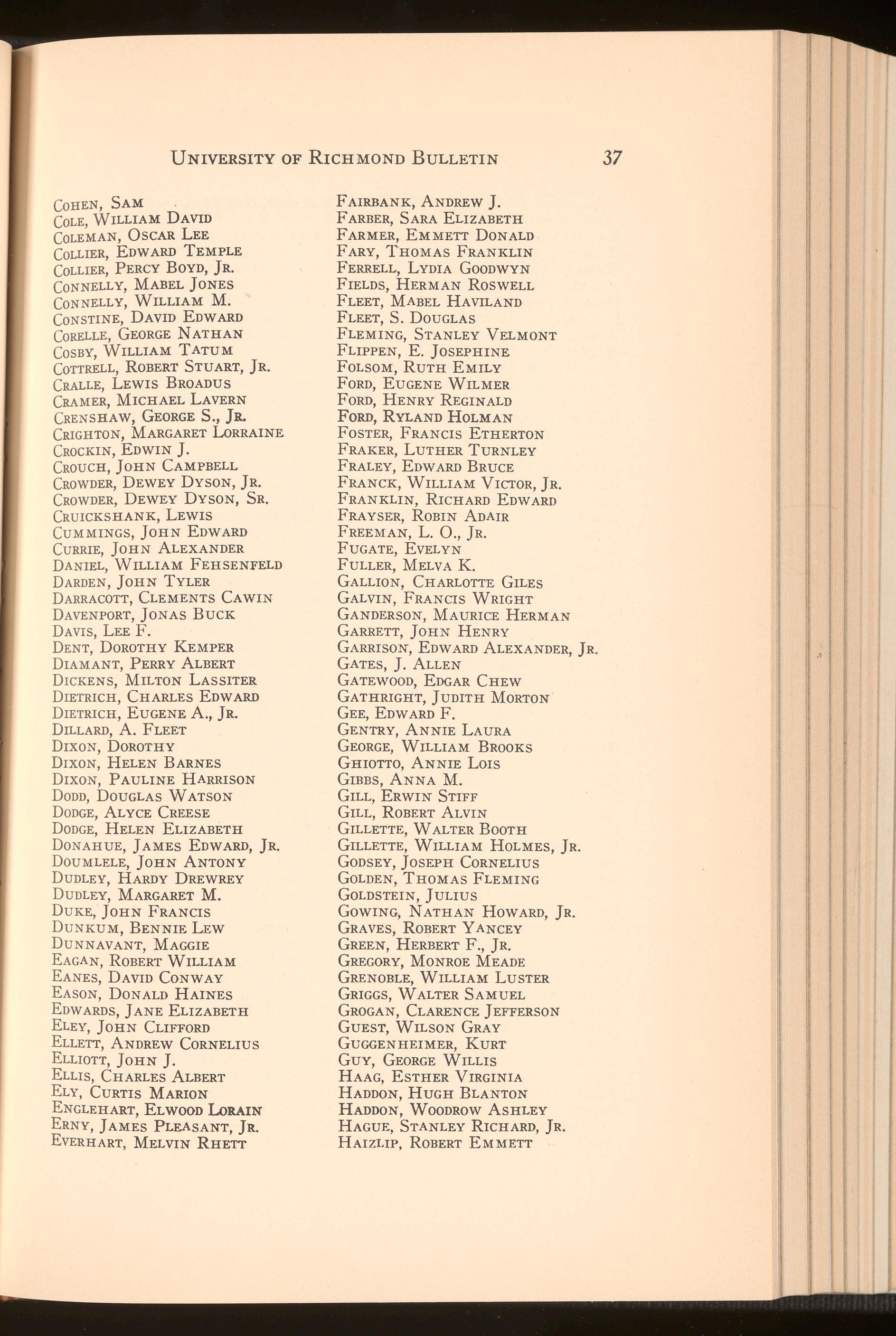
(OLE, WILLIAM DAVID
COLEMAN, OSCAR LEE
COLLIER, EDw ARD TEMPLE
(OLLIER, PERCY BOYD, ]R. (ONNELLY, MABEL ]ONES
CONNELLY, WILLIAM M.
CONSTINE, DAVID EDWARD (ORELLE, GEORGE NATHAN
CosBY, WILLIAM TATUM (OTTRELL, ROBERT STUART, ]R. (RALLE, LEWIS BROADUS (RAMER, MICHAEL LAVERN (RENSHAW, GEORGES., ]R. (RIGHTON, MARGARET LoRRAINE (ROCKIN, EDWIN].
(ROUCH, JOHN CAMPBELL
(ROWDER, DEWEY DYSON, ]R. CROWDER, DEWEY DYSON, SR. (RUICKSHANK, LEWIS
(UMMINGS, ]OHN EDWARD (URRIE, ]OHN ALEXANDER
DANIEL, WILLIAM FEHSENFELD
DARDEN, ]OHN TYLER
DARRACOTT, CLEMENTS CAWIN DAVENPORT, JONAS BucK
DAVIS, LEEF.
DENT, DOROTHY KEMPER
DIAMANT, PERRY ALBERT
DICKENS, MILTON LASSITER
DIETRICH, CHARLES EDWARD
DIETRICH, EUGENE A., ]R.
DILLARD, A. FLEET
DIXON, DOROTHY
DIXON, HELEN BARNES
DIXON, PAULINE HARRISON
Doon, DOUGLAS w ATSON DODGE, ALYCE CREESE
DODGE, HELEN ELIZABETH
DONAHUE, ]AMES EDWARD, ]R. DOUMLELE, ]OHN ANTONY
DUDLEY, HARDY DREWREY
DUDLEY, MARGARET M. DUKE, ]OHN FRANCIS
DuNKUM, BENNIE LEw
DUNNAVANT, MAGGIE
EAGAN, ROBERT WILLIAM
EANES, DAVID CONWAY
EASON, DONALD HAINES
Enw ARDS, JANE ELIZABETH
ELEY, JOHN CLIFFORD
ELLETT, ANDREW CORNELIUS
ELLIOTT, ]ORN].
ELLIS, CHARLES ALBERT
ELY, CURTIS MARION
ENGLEHART, ELWOOD LoRAIN
ERNY, ]AMES PLEASANT, ]R. EVERHART, MELVIN RHETT
FAIRBANK, ANDREW ]. FARBER, SARA ELIZABETH FARMER, EMMETT DONALD
F ARY, THOMAS FRANKLIN
FERRELL, LYDIA GOODWYN
FIELDS, HERMAN ROSWELL
FLEET, MABEL HAVILAND
FLEET, S. DOUGLAS
FLEMING, STANLEY VELMONT
FLIPPEN, E. JOSEPHINE
FOLSOM, RUTH EMILY
FORD, EUGENE WILMER
FORD, HENRY REGINALD
FORD, RYLAND HOLMAN
FOSTER, FRANCIS ETHERTON
FRAKER, LUTHER TURNLEY
FRALEY, EDWARD BRUCE
FRANCK, WILLIAM VICTOR, ]R. FRANKLIN, RICHARD EDWARD
FRAYSER, ROBIN ADAIR
FREEMAN, L. 0., ]R.
FUGATE, EVELYN
FULLER, MELVA K.
GALLION, CHARLOTTE GILES
GALVIN, FRANCIS WRIGHT
GANDERSON, MAURICE HERMAN
GARRETT, ]OHN HENRY
GARRISON, EDWARD ALEXANDER, ]R
GATES, J. ALLEN
GATEWOOD, EDGAR CHEW
GATHRIGHT, ]UDITH MORTON GEE, EDWARD F.
GENTRY, ANNIE LAURA
GEORGE, WILLIAM BROOKS
GHIOTTO, ANNIE Lois
GIBBS, ANNA M.
GILL, ERWIN STIFF
GILL, ROBERT ALVIN
GILLETTE, WALTER BOOTH
GILLETTE, WILLIAM HOLMES, ]R. GODSEY, ]OSEPH CORNELIUS
GOLDEN, THOMAS FLEMING GOLDSTEIN, ]ULIUS
GOWING, NATHAN HOWARD, ]R. GRAVES, ROBERT YANCEY
GREEN, HERBERT F., JR.
GREGORY, MONROE MEADE
GRENOBLE, WILLIAM LUSTER
GRIGGS, WALTER SAMUEL
GROGAN, CLARENCE JEFFERSON
GUEST, WILSON GRAY
GuGGENHEIMER, KuRT
GuY, GEORGE WILLIS
HAAG, ESTHER VIRGINIA
HADDON, HUGH BLANTON
HADDON, WOODROW ASHLEY
HAGUE, STANLEY RICHARD, ]R. HAIZLIP, ROBERT EMMETT
HALL, BERT EDWIN
HALL, SCOTT EUGENE
HALLIHAN, AGNES ELIZABETH
HANCOCK, GEORGE w.
HANSEN, VERA MARION
HARMON, HoLT RrcHARDSON
HARPER, }AMES FRANKLIN
HARRIS, FANNIE ANDREWS
HARRIS, }OHN SHARP
HARRIS, WILLIAM SAUNDERS
HART, JAMES MALCOLM
HARTON, WILLIAM ROBERT, }R.
HAW, }OHN SHEPPARD
HAWKINS, }ESSIE LOUISE
HAYES, EDWARD JOHNSTON
HEATH, WILLIAM M.
HEINRICH, THOMAS OSWALD
HENDERSON, WARREN
HERBERT, THOMAS S.
HERNDON, BRODIE STRACHAN
HERRING, VERNON M.
HIBBARD, CHARLES EDw ARDS
HIGHTOWER, LOUEASA C.
HILL, }ULIAN HUTSON, }R.
HILLIER, JAMES LACH LAN
HINTON, JOSEPH FLEMMON
HOFFMAN, BEN HOWARD
HOFHEIMER, NORMA }ANET
HOLSCLAW, ROBERT E.
HOMEIER, ADOLPH
HOOKER, EDMOND ANDERSON
HOWELL, A. GIBSON
HUDGINS, WILLIAM }ESSE, }R.
HUDSON, NANCY CREWS
HUGHES, CHARLES RUSSELL
HUTCHINSON, WARNER COURTNEY, ]R. INGRAM, L. GEORGE
JACKSON, WILLIAM WALTER
}ACOBS, WILLIAM BICKNELL
JACOBSON, HERMAN ISRAEL
JENKINS, HELEN GOLDEN
JENNINGS, }OHN PRESTON
}OHNSON, HENRY RAY
JOHNSON, STELLA LOUISE
JOHNSTON, COLEMAN, JR.
}OHNSTON, EDWIN BARBER
}ONES, GEORGE WESLEY, }R.
}ONES, LEONARD
}ONES, REX ORION, }R.
JONES, RICHARD WALTER, III
JoNES, VILLIA RAMOS
}ONES, WILLIAM HENRY
}ONES, WILLIAM WALTON
JOYNER, CRAWLEY FINNEY
}OYNER, HILDAH
JURGENS, }OHN FREDERICK BURCHARDT, }R.
}URGENS, MAUDE SMITH
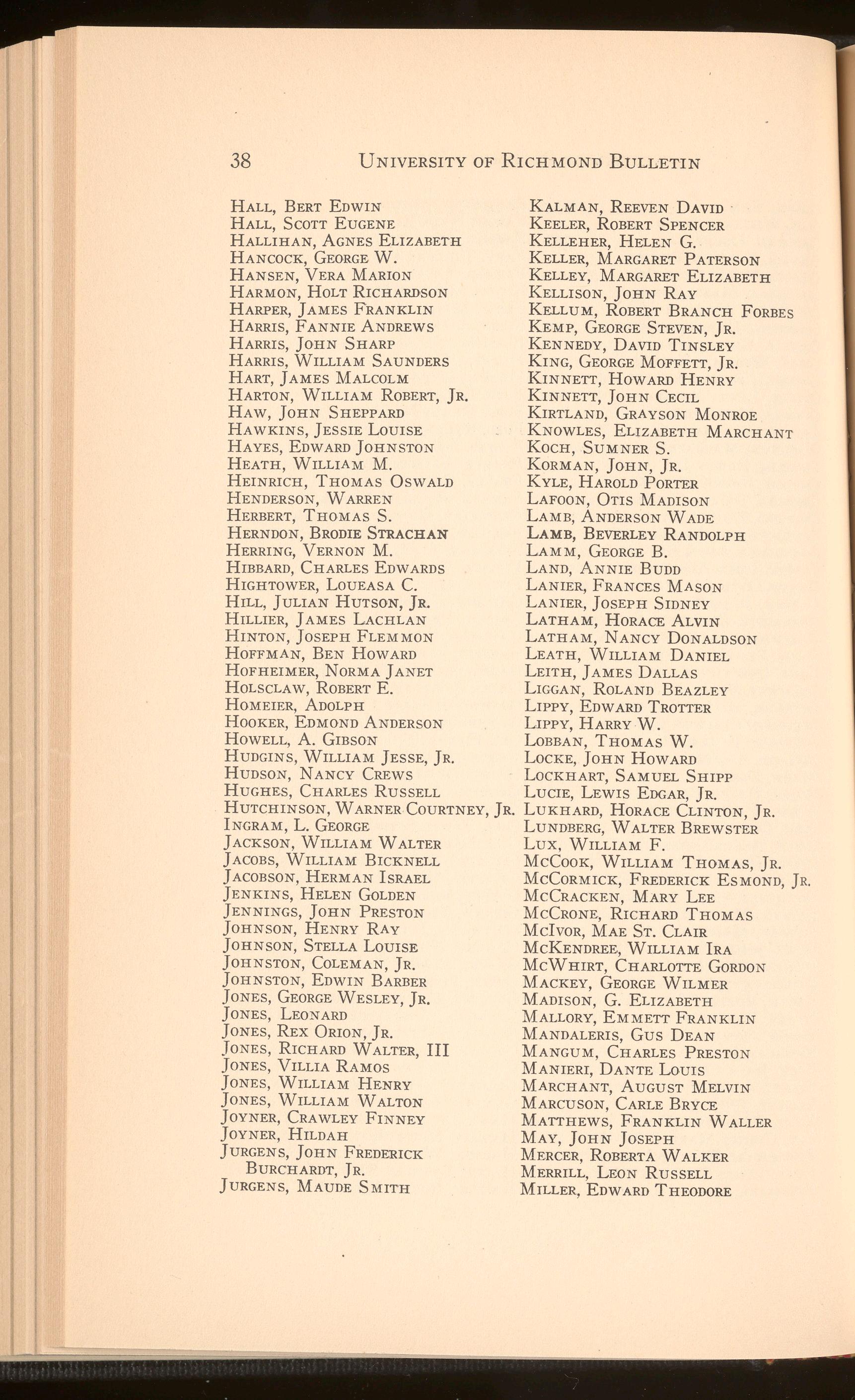
KALMAN, REEVEN DAVID
KEELER, ROBERT SPENCER
KELLEHER, HELEN G.
KELLER, MARGARET p ATERSON
KELLEY, MARGARET ELIZABETH
KELLISON, }OHN RAY
KELLUM, ROBERT BRANCH FORBES
KEMP, GEORGE STEVEN, ]R. KENNEDY, DAVID TINSLEY
KING, GEORGE MOFFETT, JR.
KINNETT, HOWARD HENRY
KINNETT, }OHN CECIL
KIRTLAND, GRAYSON MONROE
KNOWLES, ELIZABETH MARCHANT
KOCH, SUMNER S.
KORMAN, }OHN, }R.
KYLE, HAROLD PORTER
LAFOON, Ons MADISON
LAMB, ANDERSON WADE
LAMB, BEVERLEY RANDOLPH
LAMM, GEORGE B.
LAND, ANNIE BUDD
LANIER, FRANCES MASON
LANIER, }OSEPH SIDNEY
LATHAM, HORACE ALVIN
LATHAM, NANCY DONALDSON
LEATH, WILLIAM DANIEL
LEITH, JAMES DALLAS
LIGGAN, ROLAND BEAZLEY
LIPPY, EDWARD TROTTER
LlPPY, HARRY w. LOBBAN, THOMAS W.
LOCKE, }OHN HOWARD
LOCKHART, SAMUEL SHIPP
LUCIE, LEWIS EDGAR, JR.
LUKHARD, HORACE CLINTON, }R. LUNDBERG, WALTER BREWSTER
Lux, WILLIAM F.
McCooK, WILLIAM THOMAS, JR. McCORMICK, FREDERICK EsMOND, JR. McCRACKEN, MARY LEE
MCCRONE, RICHARD THOMAS
MclvoR, MAE ST CLAIR
McKENDREE, WrLLIAM IRA
McWHIRT, CHARLOTTE GoRDoN
MACKEY, GEORGE WILMER
MADISON, G. ELIZABETH
MALLORY, EMMETT FRANKLIN
MANDALERIS, Gus DEAN
MANGUM, CHARLES PRESTON
MANIERI, DANTE Lours
MARCHANT, AUGUST MELVIN
MARCUSON, CARLE BRYCE
MATTHEWS, FRANKLIN WALLER
MAY, }OHN JOSEPH
MERCER, ROBERTA WALKER
MERRILL, LEON RUSSELL
MrLLER, EDw ARD THEODORE
MILL ER, HOWARD SYDNOR
MILLE R, JOHN LEE
MILLE R, WILLIAM LEE
MINTE R, CHARLES ROY
MONC RIEF , THOMAS HAROLD
MooRE, CHARLES COLEMAN
MOORE, JOHN CURTIS
MOORE, LEO PATRICK
MooRE , RoBERTA LEE
MooRE , THOMAS THORN
MORAN , THOMAS JOSEPH
MORGAN, MILTON RITCHIE
Moss, EMILY JOHNSON
MOYE R, OLIVER, JR.
Mu LWEE, HARVEY SMITH
NASH, VIRGINIA
NELS ON , THEODORE
NEW, EVERETT PRINCE
NEWBY, WILLIAM EDWARD
NEWM A N , NATHANIEL SAUNDERS
NICH OLSON, GEORGE ANDREW
NORM AN, JosEPH HENRY
NORRIS , RA VEE
NORVELL, THOMAS GREGORY
NUC KOLS , LAUGHTON WATKINS, J'ft.
NUNN ALLY, ARTHUR CARLTON
NUNN ALLY, CHARLES CALAWAY
NUN NALLY, G. LLOYD
NUSS MAN, SAMUEL LEWIS
OAKL EY , LoUIS AUSTIN
O'NE IL, PAUL GRAHAM
ORR, LEWIS p ARKER
OWEN , BEN PIERSON
OWE N , EVERETT MONTAGUE
OWE N, RANDOLPH MAYNARD, JR
OWE N , WILLIAM JOSEPH
PADGETT, SAMUEL FLEMING
PAG ANELLI, JOHN
PA RK ER, JOHN HERMAN
PARKE R, STEPHEN E.
PA RKS, Roy CLEON, JR
PAR KS, WOODROW LEON
PAR RISH, LINWOOD GIBSON
PA RSONS, TOWNSEND SHEPPARD
PA TTESON, MONCURE P.
PAU LI , DAVID GUTHRIE
PAYN E, JOHN MADISON
PE NZER, LOUIS VICTOR
PEP PIN, ALEXANDER CLIFFORD
PERC IVALL, CHARLES RIDDICK
PERK INS , HARRY HALE
PER RIN, FORREST E.
PE TREE, GARLAND WALTON
PFIS TER, FREDERICK WILLIAM
PHI LLIPS, JOHN B.
PH ILLIPS, MARY VIRGINIA
PH ILLIPS, RALPH GEORGE
PH ILLIPS , V. LANCE
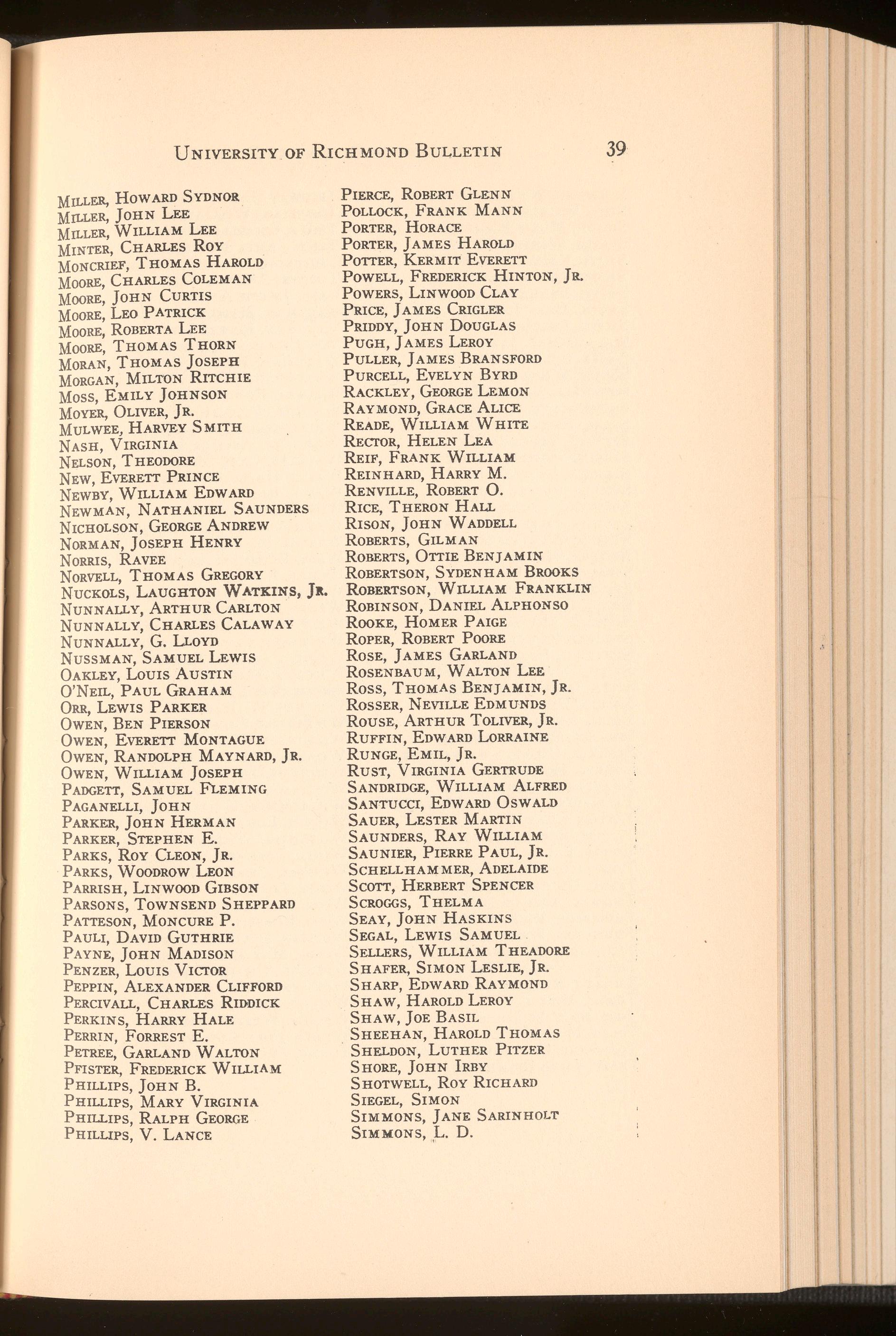
PIERCE , ROBERT GLENN
POLLOCK, FRANK MANN
PORTER, HORACE
PORTER, JAMES HAROLD
POTTER, KERMIT EVERETT
POWELL, FREDERICK HINTON, JR.
POWERS, LINWOOD CLAY
PRICE, JAMES CRIGLER
PRIDDY, JOHN DOUGLAS
PUGH , JAMES LEROY
PULLER, ]AMES BRANSFORD
PURCELL, EVELYN BYRD
RACKLEY, GEORGE LEMON
RAYMOND, GRACE ALICE
READE, WILLIAM WHITE
RECTOR, HELEN LEA
REIF, FRANK WILLIAM
REINHARD, HARRY M
RENVILLE , ROBERT 0
RICE, THERON HALL
RISON, JOHN WADDELL
ROBERTS , GILMAN
ROBERTS, 0TTIE BENJAMIN
ROBERTSON, SYDENHAM BROOKS
ROBERTSON, WILLIAM FRANKLIN
ROBINSON, DANIEL ALPHONSO
ROOKE, HOMER p AIGE
ROPER, ROBERT POORE
ROSE, ]AMES GARLAND
ROSENBAUM, WALTON LEE
Ross , THOMAS BENJAMIN, JR
ROSSER, NEVILLE EDMUNDS
ROUSE, ARTHUR TOLIVER, ]R . RUFFIN, EDWARD LoRRAINE
RUNGE, EMIL, JR.
RusT, VIRGINIA GERTRUDE
SANDRIDGE, WILLIAM ALFRED
SANTUCCI , EDWARD OSWALD
SAUER, LESTER MARTIN
SAUNDERS, RAY WILLIAM
SAUNIER, PIERRE PAUL, JR.
SCHELLHAMMER, ADELAIDE
Scorr , HERBERT SPENCER
SCROGGS, THELMA
SEAY, JOHN HASKINS
SEGAL, LEWIS SAMUEL
SELLERS, WILLIAM THEADORE
SHAFER, SIMON LESLIE, JR
SHARP, EDWARD RAYMOND
SHAW, HAROLD LEROY
SHAW, ]OE BASIL
SHEEHAN, HAROLD THOMAS
SHELDON, LUTHER PITZER
SHORE, JOHN IRBY
SHOTWELL , Roy RICHAR D
SIEGEL, SIMON
SIMMONS , JANE SARIN HO LT
SIMMONS, ,L. D
SIMMONS, WILLARD RUSSEL
SIMS, WILBUR MONTGOMERY
SISSON, HUGH HAMILTON
SLATER, WINFREE HUDSON
SMITH, CECIL ANDREW
SMITH, GRACE WINGFIELD
SMITH, FRANKLIN AUSTIN
SMITH, MARY LAURIE
SMITH, OLIVER WENDELL
SOMMERVILLE, ]AMES HARRIS
SONES, BYRANCA ELISABETH
SOUTH, MARIE LEON
SOUTHALL, JAMES WALTER
SOUTHWORTH, LAWRENCE EDWARD
SPEAS, HERBERT p ARR
SPENCER, FREEMAN, JR.
SPENCER , GEORGE ALBERT
SPENGER, JOHN N., JR.
SPILLER, ROBERT MILES
SPRINKEL, GEORGE A.
.STAPLES, HERBERT LAFAYETTE, JR.
STARKE, WILLIAM MEADE
STEINER , HENRY LESTER
STELJES, FRED R.
STEPHENSON, GEORGE AUGUSTUS, JR.
STERN , CARY ELLIS, JR.
STERRETT, IDA SLOAN
STEUART, GEORGE H.
STILLINGS, HAROLD ELLIS
STITH, DAVID HUNNICUTT
STITH, GERALD KENNEDY
STOKES, HENRY
STONE, ROBERT LECKY
STRANGE, BERNICE ARCHER
STRANGE, GEORGE SHACKELFORD
SUTTON, HOWARD, JR.
SWARTWOUT, JOHN B., ]R.
TALIAFERRO, WILLIAM HOGE, JR.
TAYLOR, RILEY G.
TAYLOR, ROBERT MILTON
TEPPER, RoY
TERRY, CHARLES RICHARDS
TERRY, DUDLEY PAYNE
THOMAS, ARTHUR DICKEN
THOMPSON, RICHARD MERRILL
THOMPSON, ROBERT CURTIS
THURSTON, CLARENCE SIDNA
TINDER, WALLACE p AUL
TINSLEY , RUSSELL CLAY
TOBIAS, MOLLIE
Tonn, RICHARD Lours
TOLAR, MARY C.
TOMPKINS, CHRISTOPHER ROBINSON
TRACY , JACOB REINHARDT
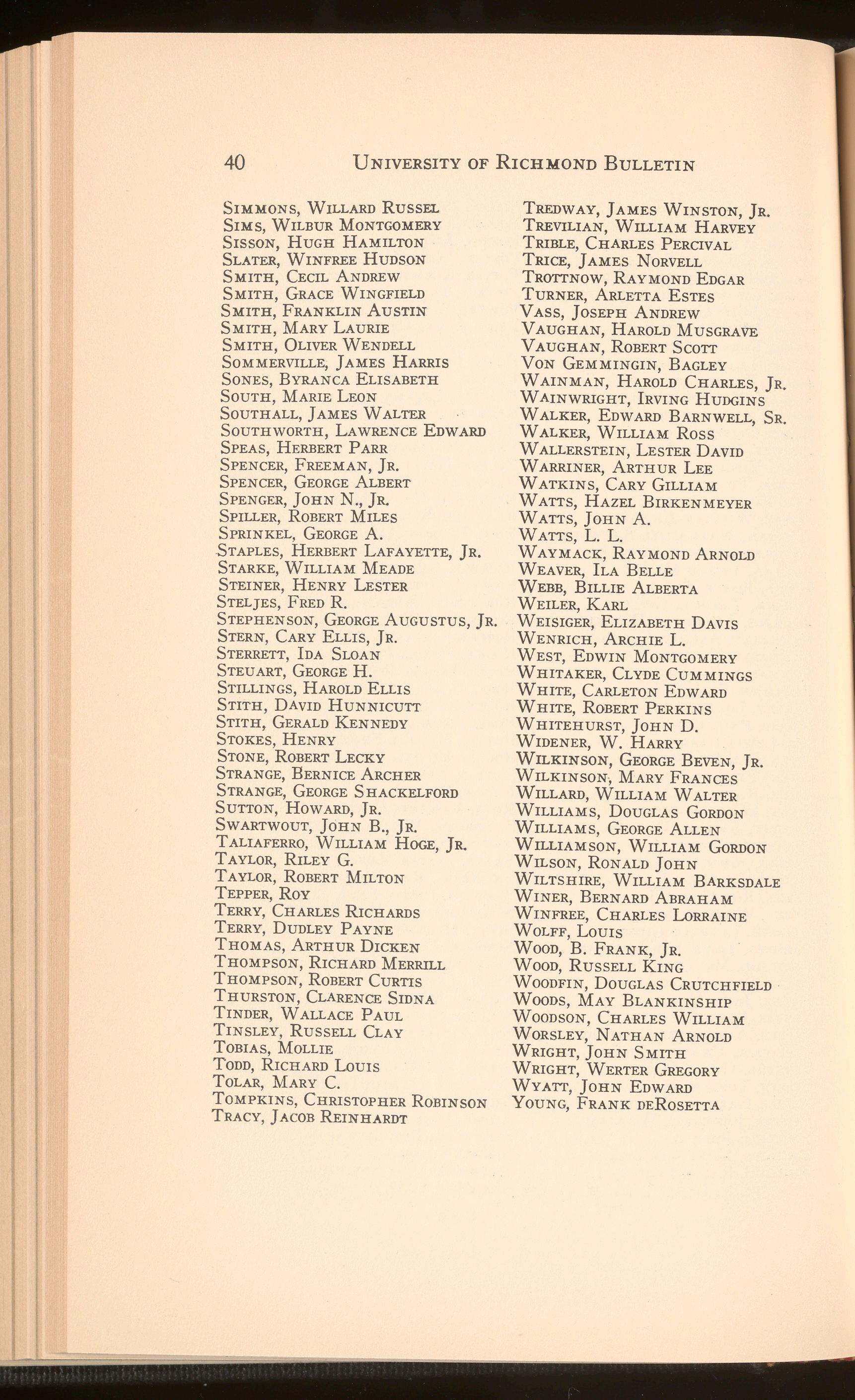
TREDWAY, ]AMES WINSTON, JR.
TREVILIAN, WILLIAM HARVEY
TRIBLE, CHARLES PERCIVAL
TRICE, ]AMES NORVELL
TROTTNOW, RAYMOND EDGAR
TURNER, ARLETTA ESTES
VASS, JOSEPH ANDREW
VAUGHAN, HAROLD MUSGRAVE
VAUGHAN, ROBERT SCOTT
VoN GEMMINGIN, BAGLEY
WAINMAN, HAROLD CHARLES, JR.
WAINWRIGHT, !RVING HUDGINS
WALKER, EDWARD BARNWELL, SR. w ALKER, WILLIAM Ross
W ALLERSTEIN, LESTER DAVID
WARRINER, ARTHUR LEE
WATKINS, CARY GILLIAM
WATTS, HAZEL BIRKENMEYER
WATTS, JOHN A.
WATTS, L. L.
WAYMACK, RAYMOND ARNOLD
WEAVER, ILA BELLE
WEBB, BILLIE ALBERTA
WEILER, KARL
WEISIGER, ELIZABETH DAVIS
WENRICH, ARCHIE L.
WEST, EDWIN MONTGOMERY
WHITAKER, CLYDE CUMMINGS
WHITE, CARLETON EDWARD
WHITE, ROBERT PERKINS
WHITEHURST, JOHN D.
WIDENER, vv.HARRY
WILKINSON, GEORGE BEVEN, JR.
WILKINSON , MARY FRANCES
WILLARD, WILLIAM WALTER
WILLIAMS, DOUGLAS GORDON
WILLIAMS, GEORGE ALLEN
WILLIAMSON, WILLIAM GoRDON
WILSON, RONALD JOHN
WILTSHIRE, WILLIAM BARKSDALE
WINER, BERNARD ABRAHAM
WINFREE, CHARLES LoRRAINE
WOLFF, Lours
Woon, B. FRANK, JR.
Woon, RussELL KING
WOODFIN, DOUGLAS CRUTCHFIELD
Woons, MAY BLANKINSHIP
WOODSON, CHARLES WILLIAM
WORSLEY, NATHAN ARNOLD
WRIGHT, ]OHN SMITH
WRIGHT, WERTER GREGORY
WYATT , ]OHN EDWARD
YOUNG, FRANK DEROSETTA
Certificates Awarded, June, 1941
JoHN HENRY ADAMS ..•
WIL LI A M WALTON JoNES
DAVI D TINSLEY KENNEDY
PAUL G RAHAM O'NEIL
DANIE L ALPHONSO RoBINSON
ROBERT GLENN PIERCE
Scholarships Awarded, June, 1941
LYDIA G OODWYN FERRELL . .
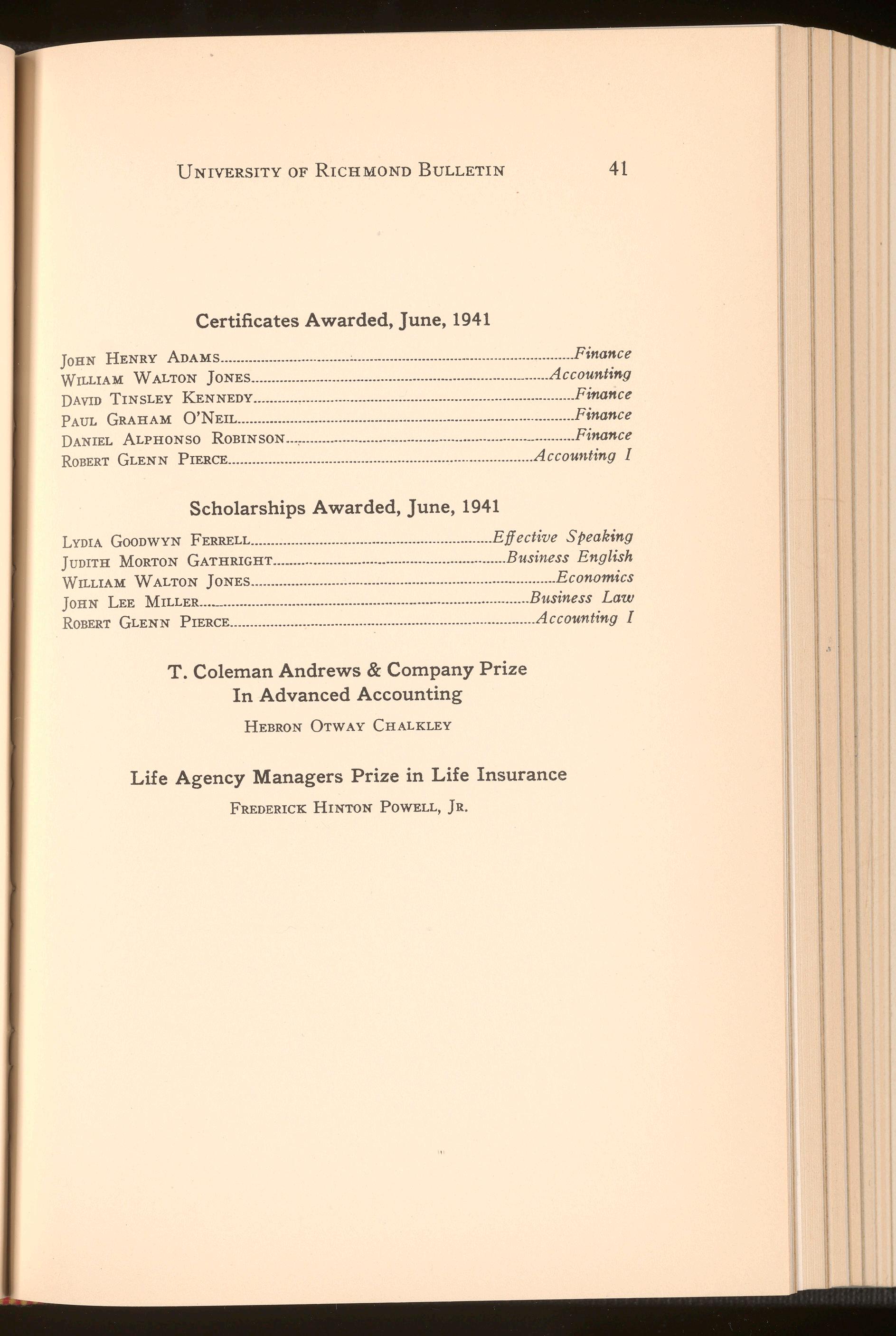
Finance
Accou,iting
Finance
Finance
Accou1iting I
E!fect ive Speaking
JuoI TH MORTON GATHRIGHT . .. B11siness English
WIL LIAM wALTON J ONES
JOHN LEE MILLER
ROBERT GLENN PIERCE
T. Coleman Andrews & Company Prize In Advanced Accounting
HEBRON OTWAY CHALKLEY
•Economics
Law
Accounting I
Life Agency Managers Prize in Life Insurance
FRED ERICK HINTON POWELL, JR






